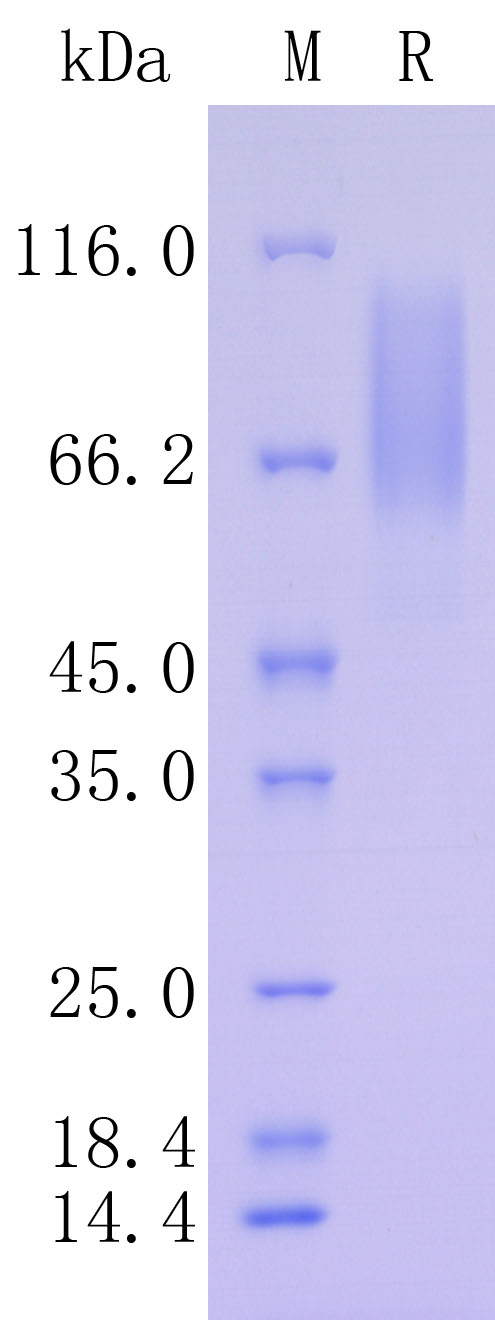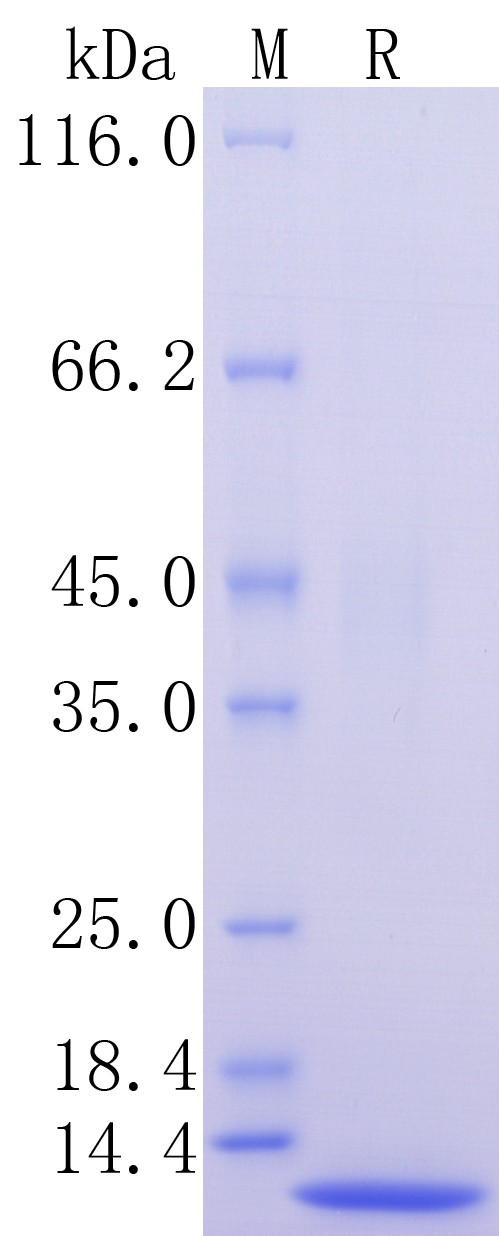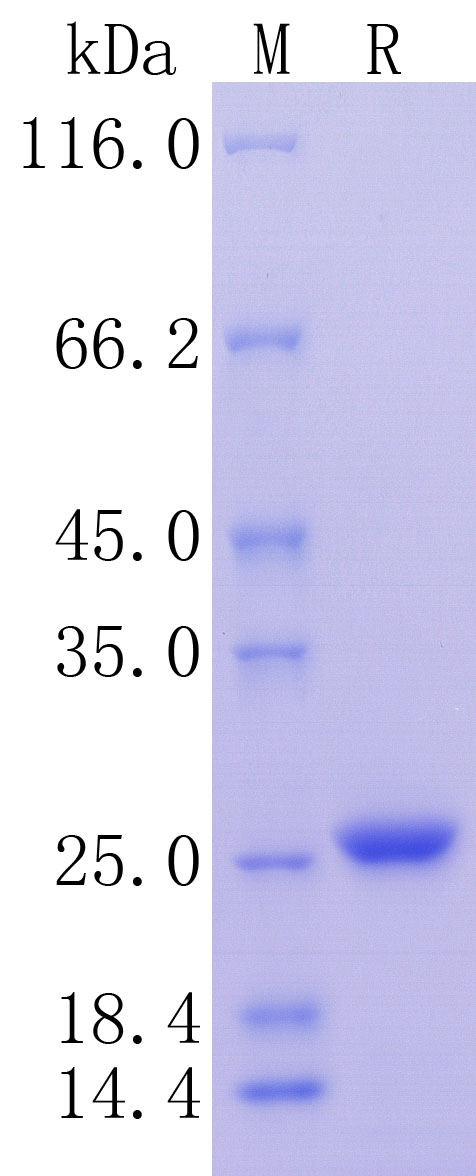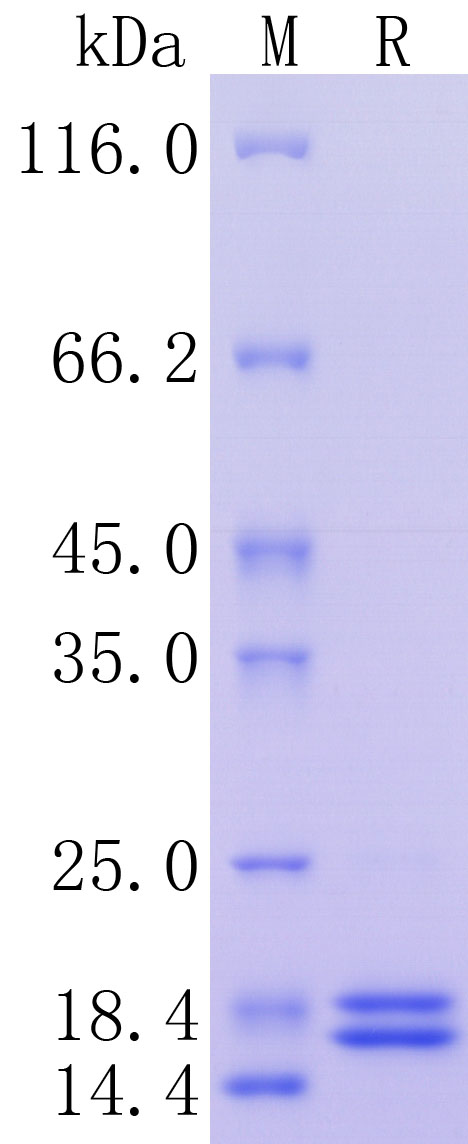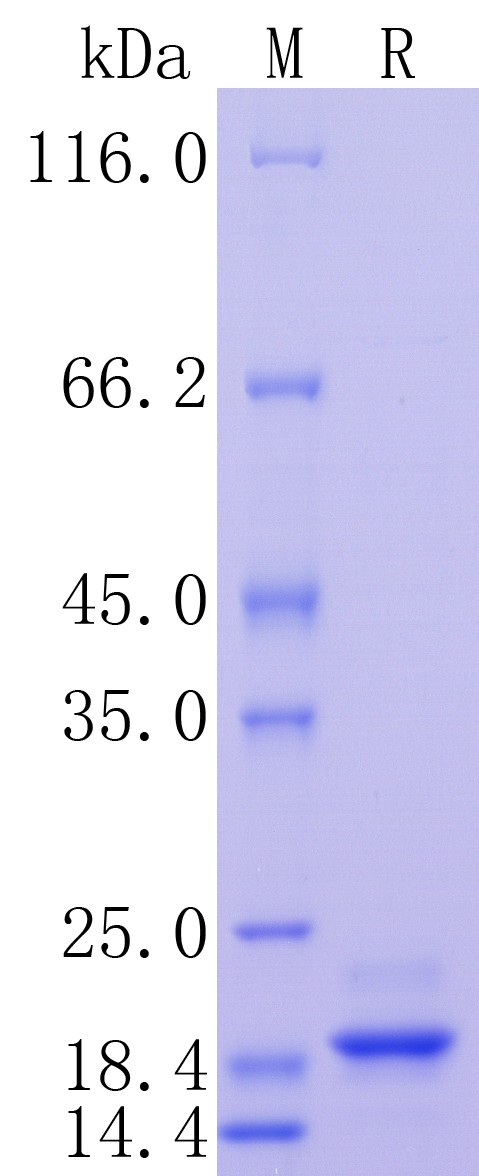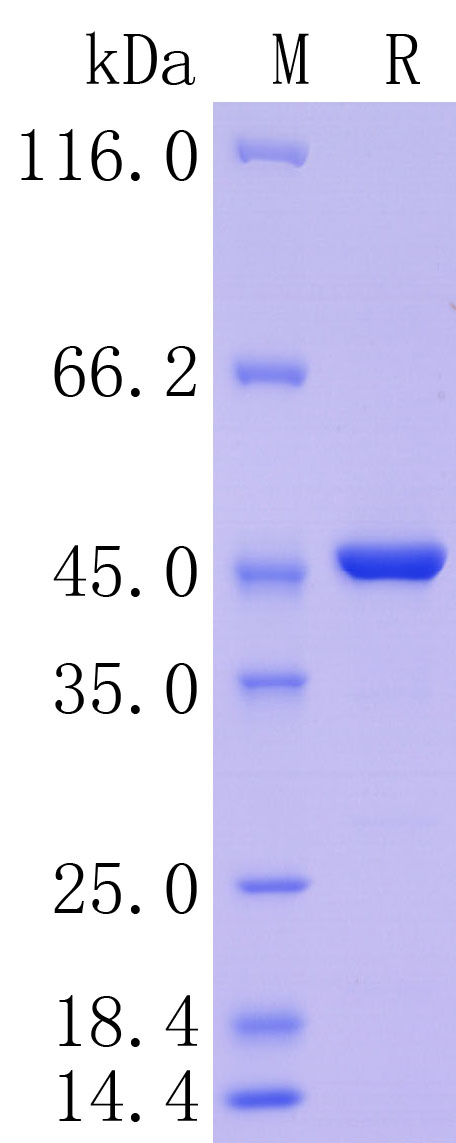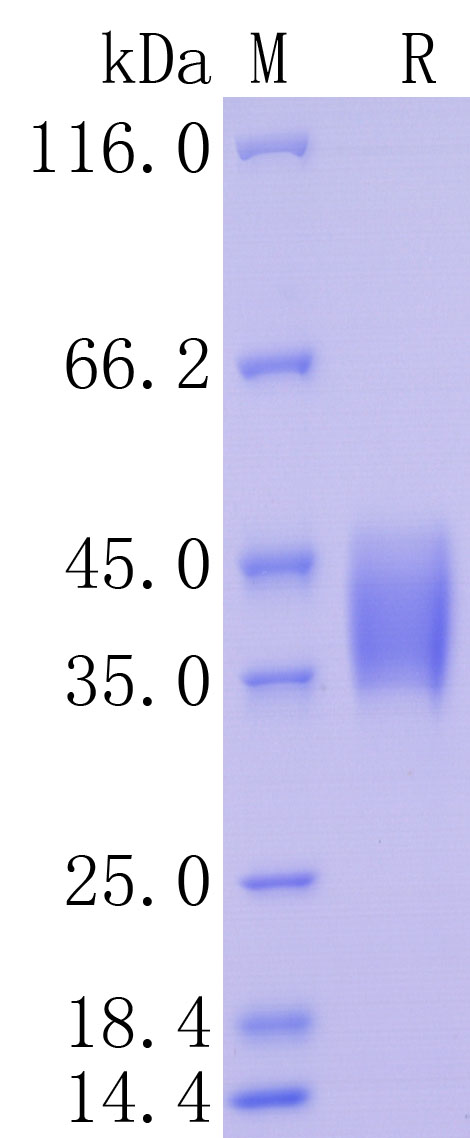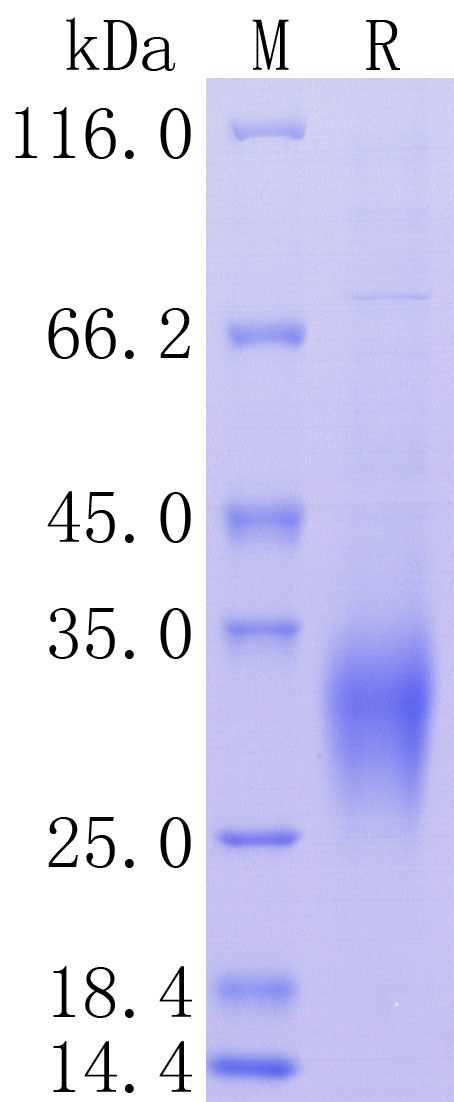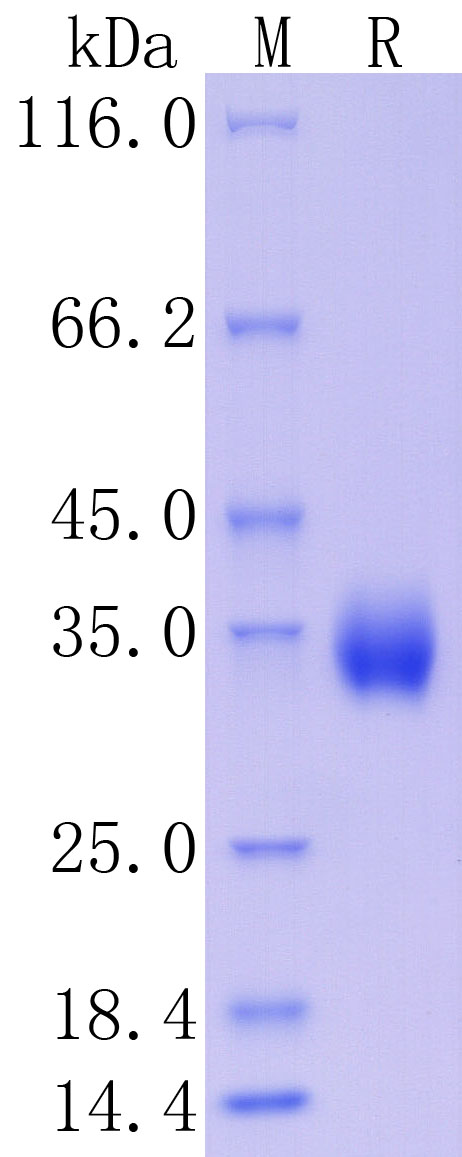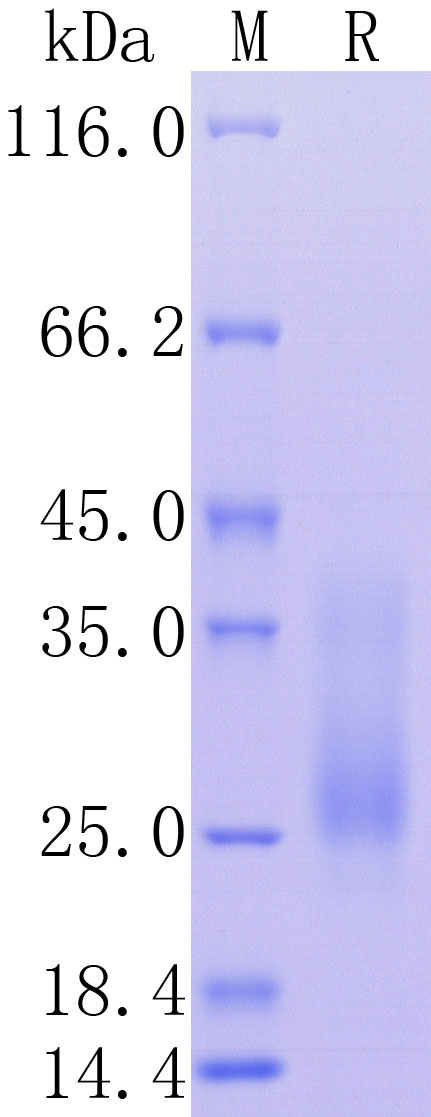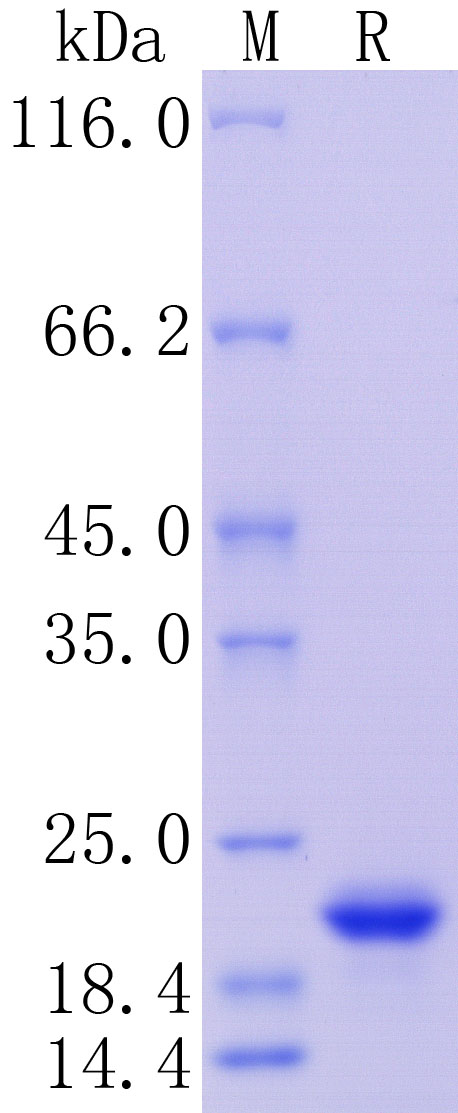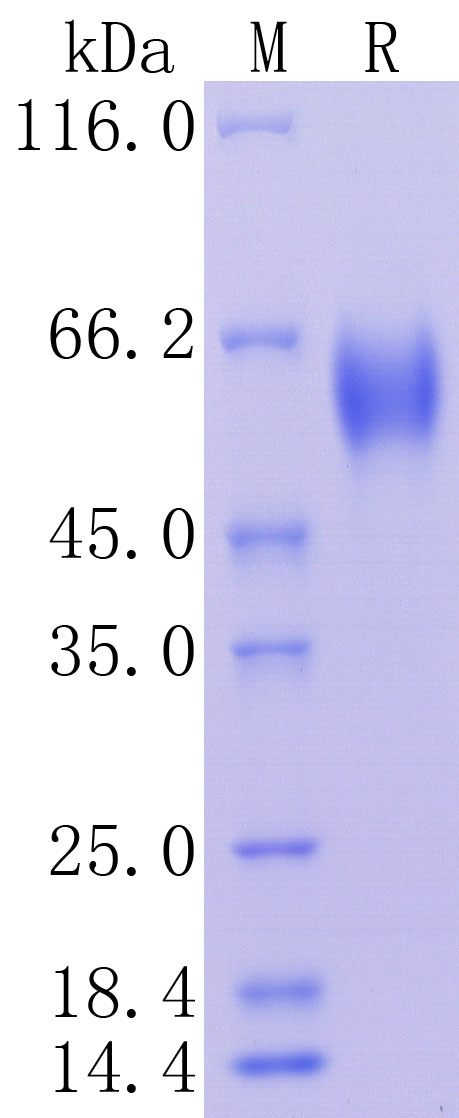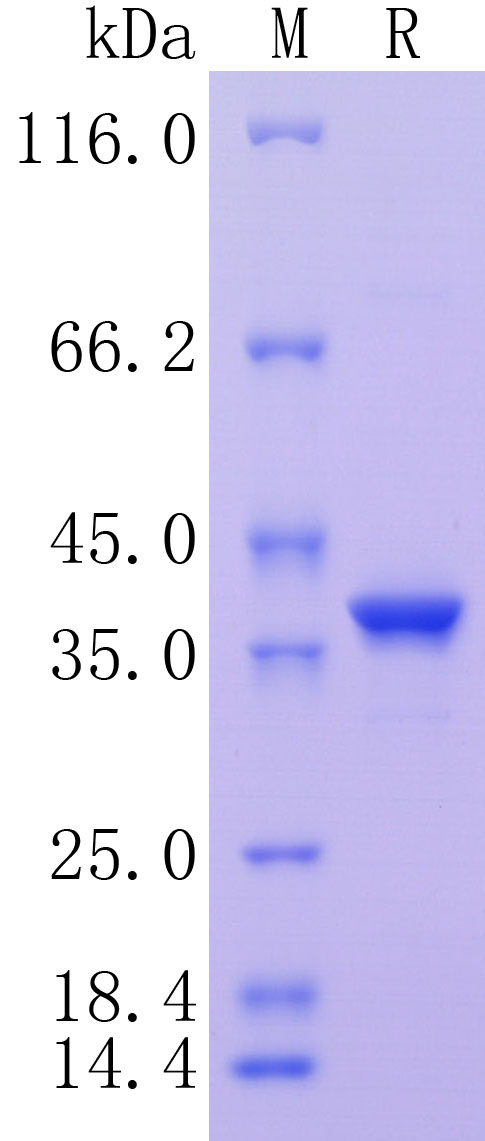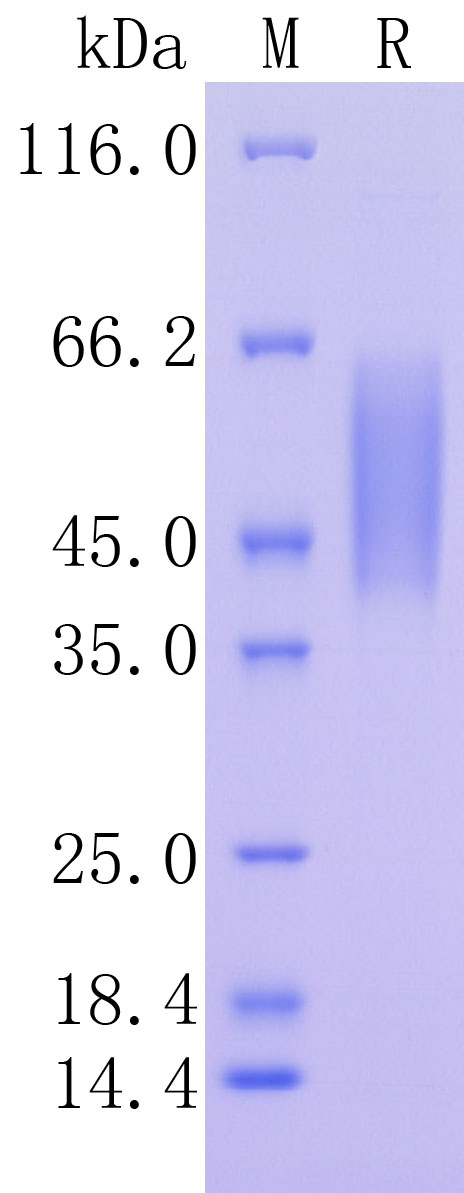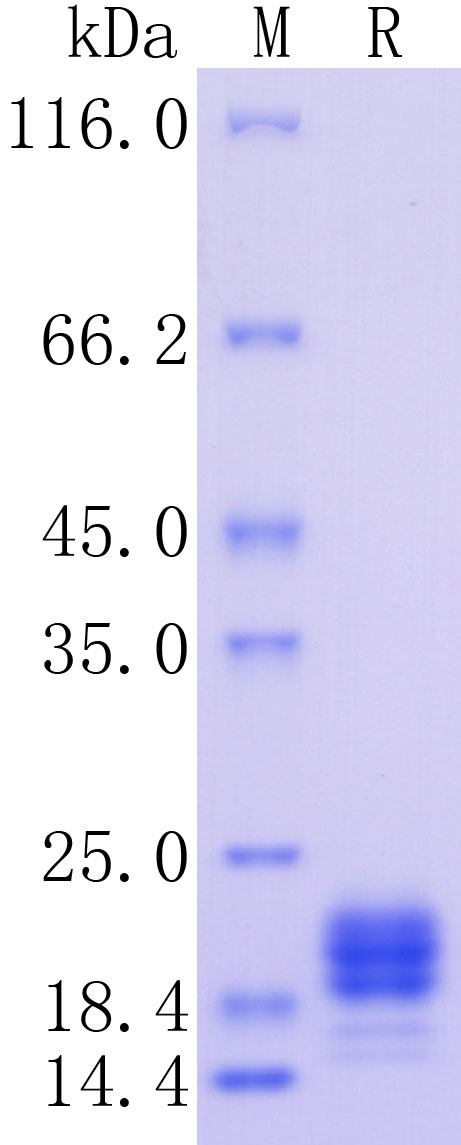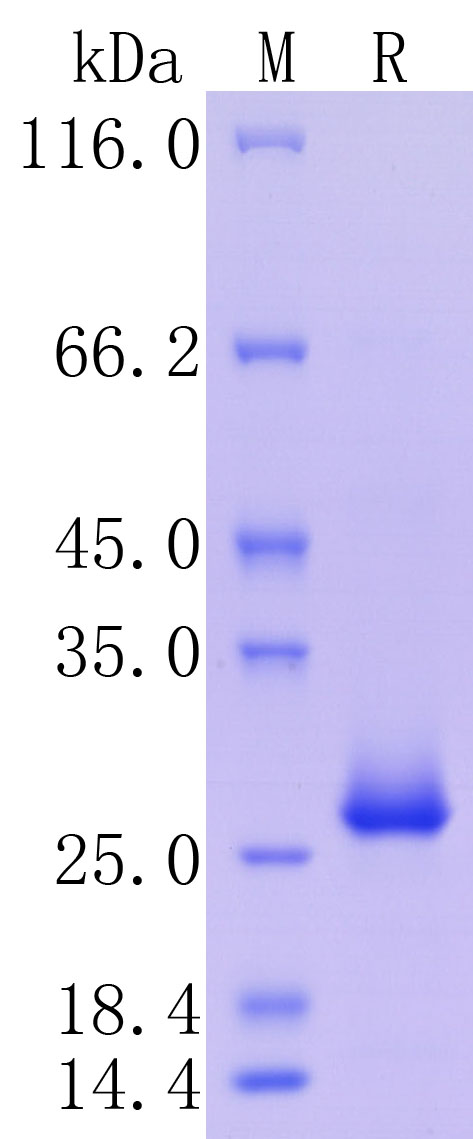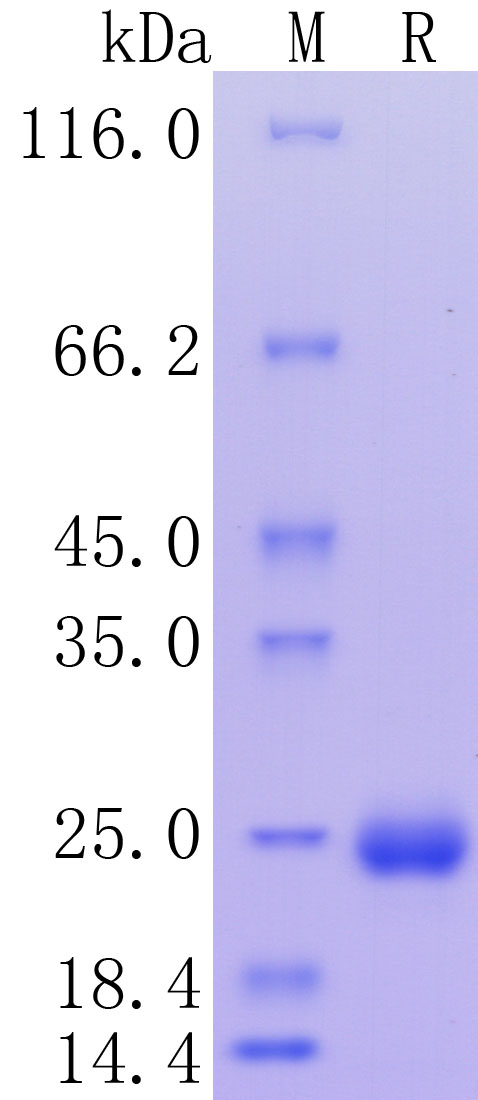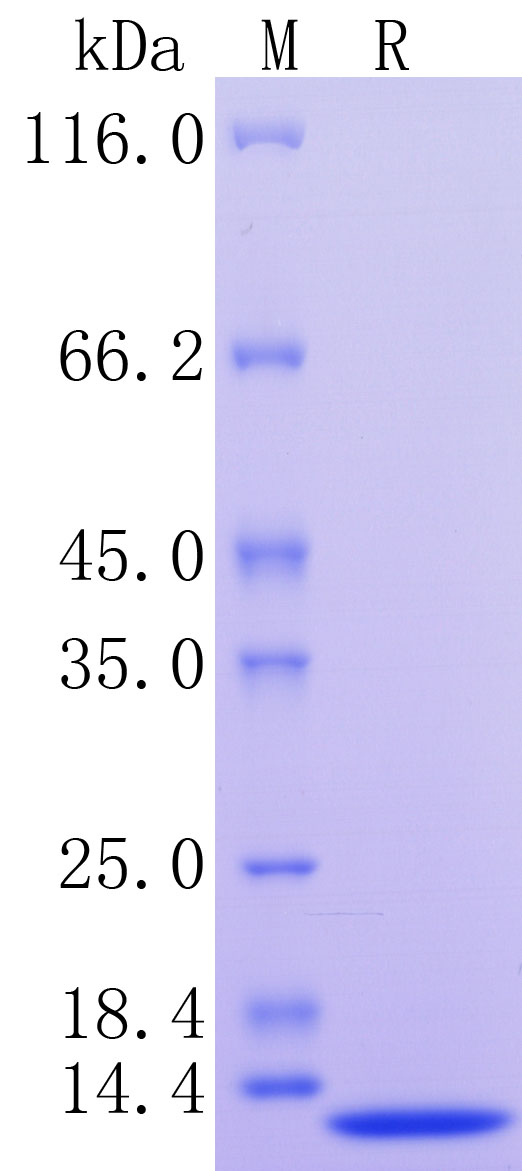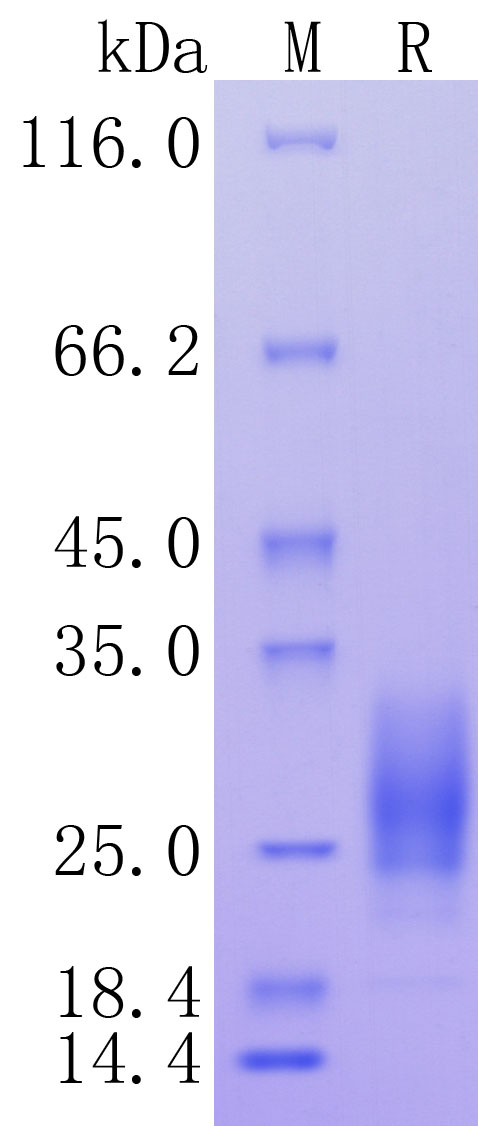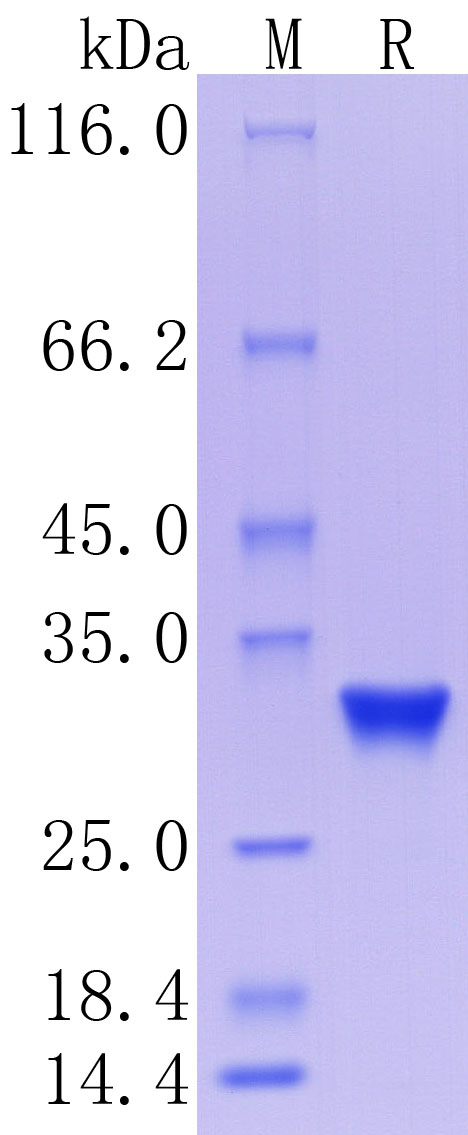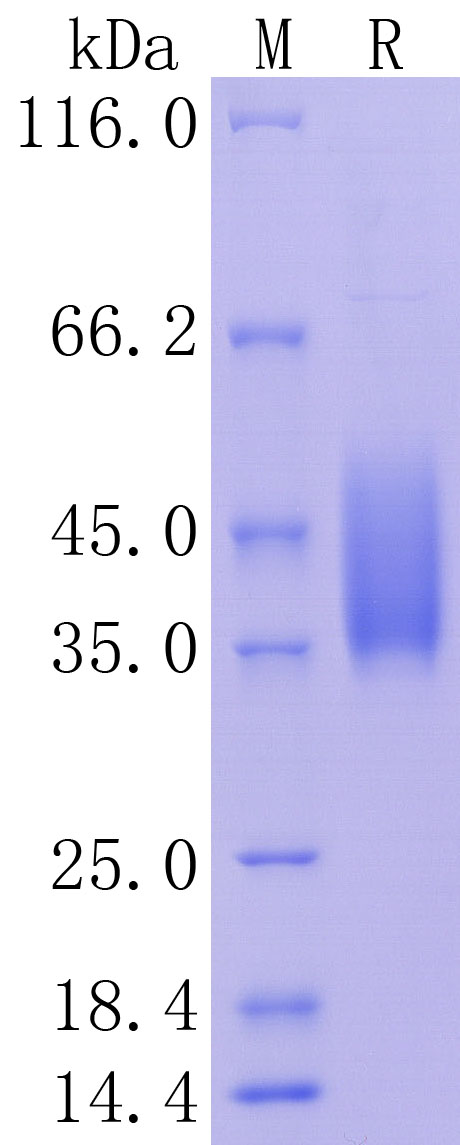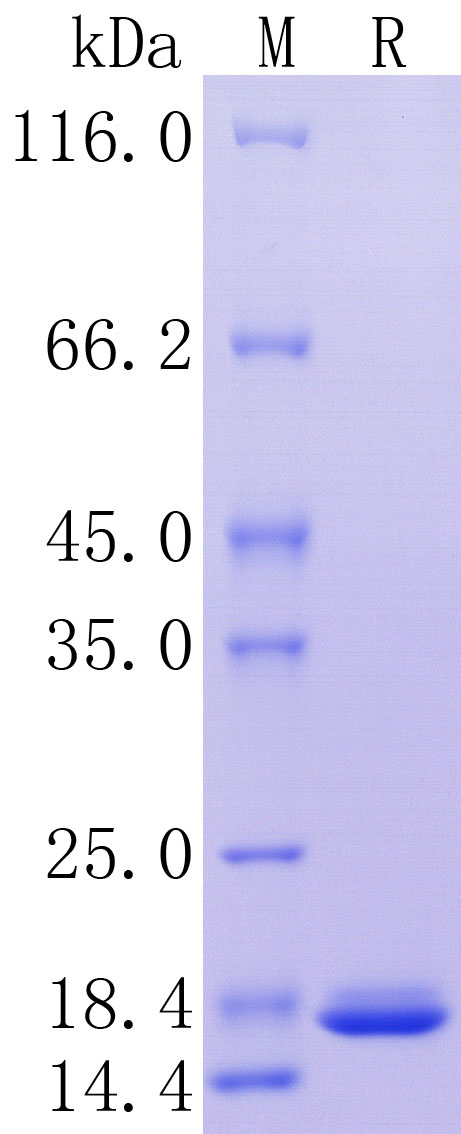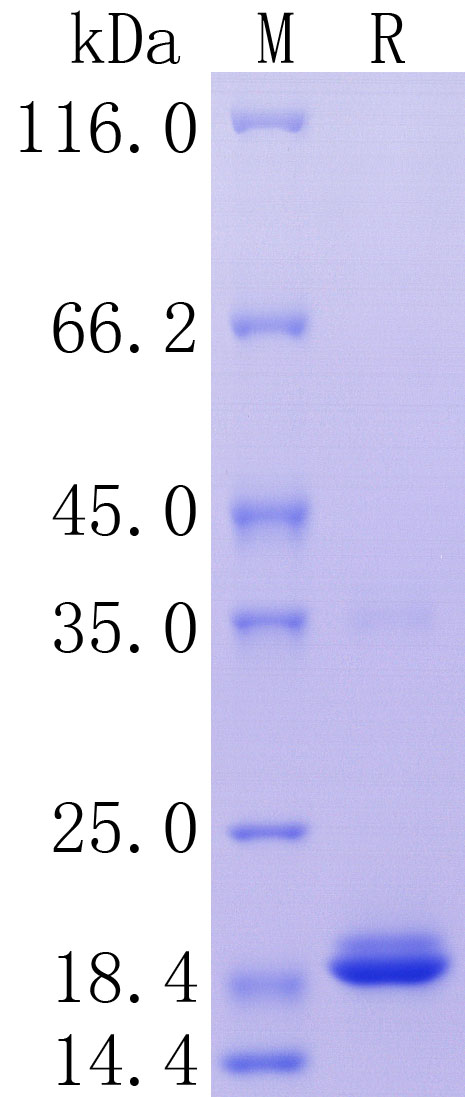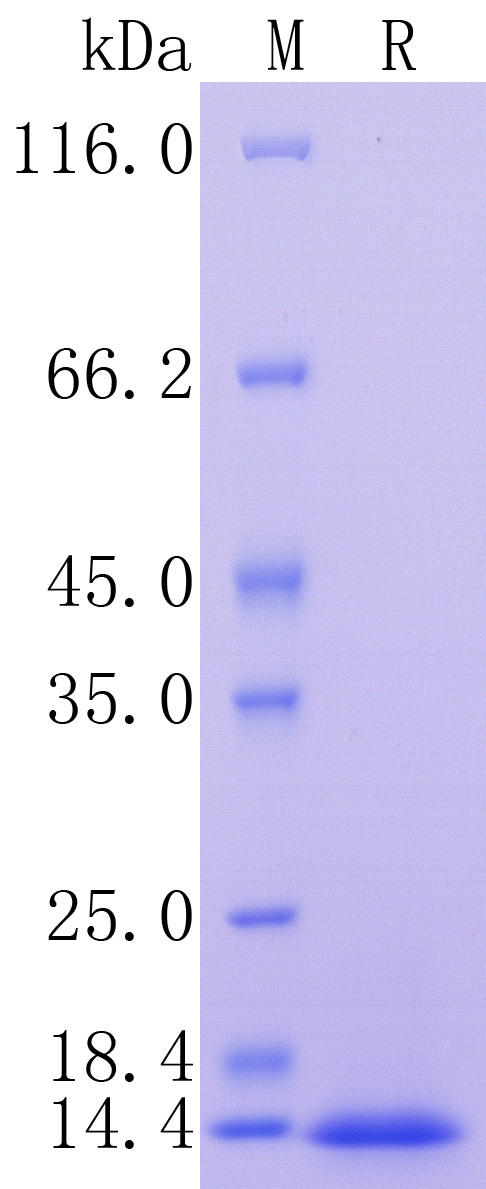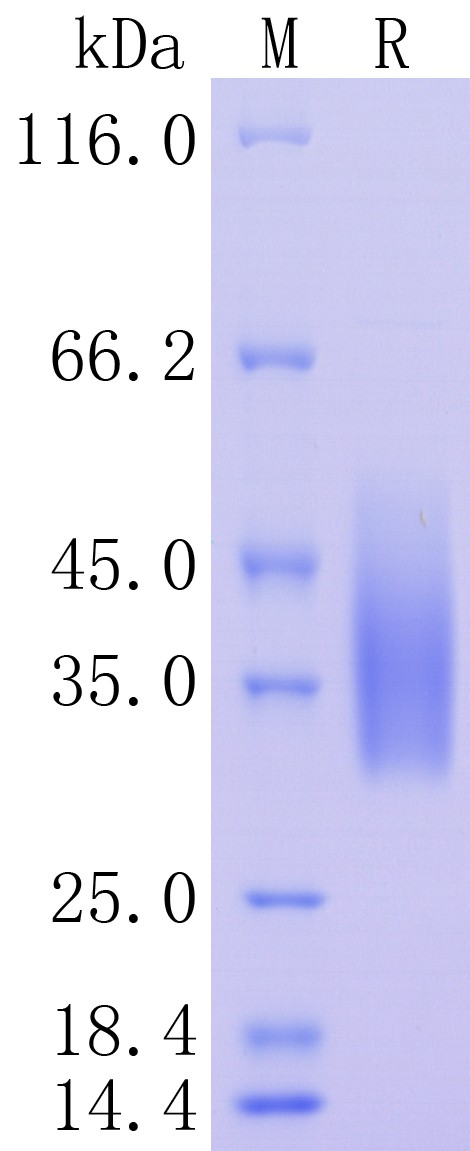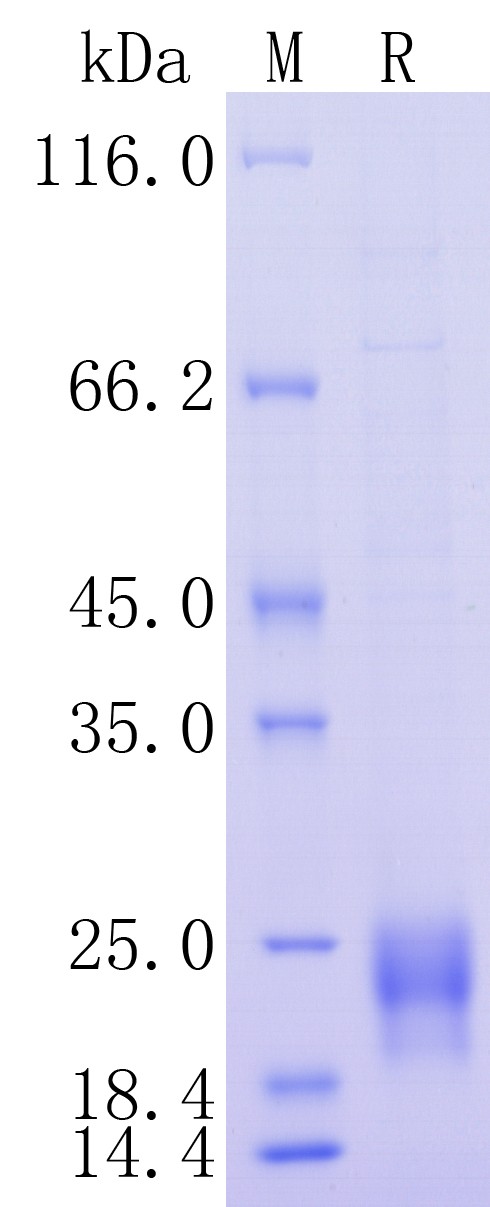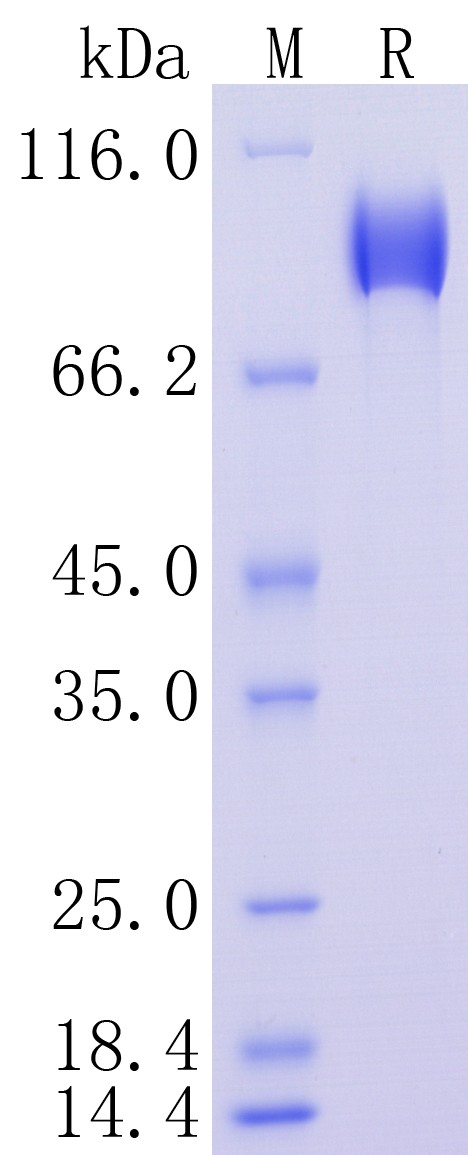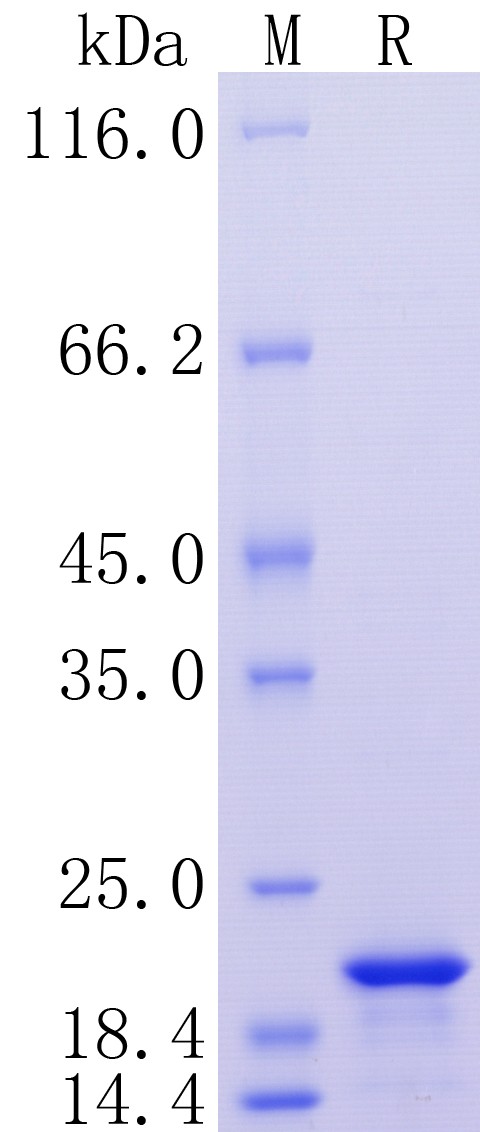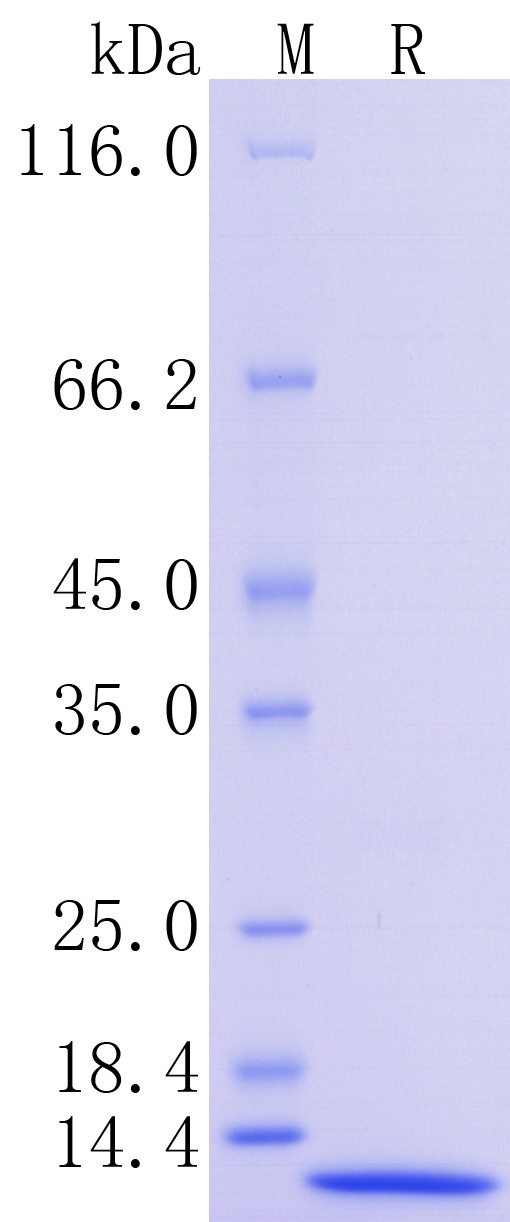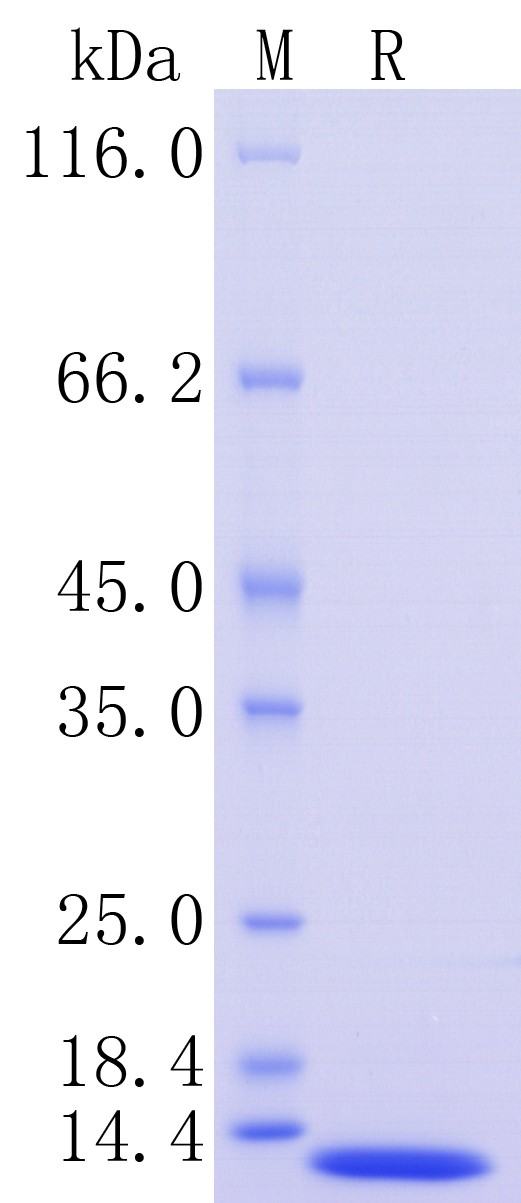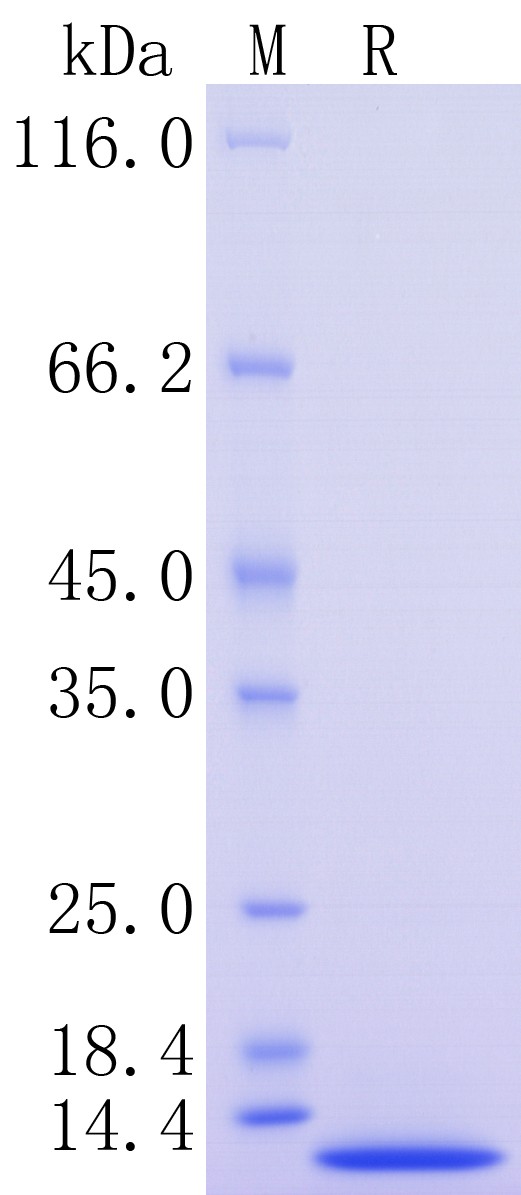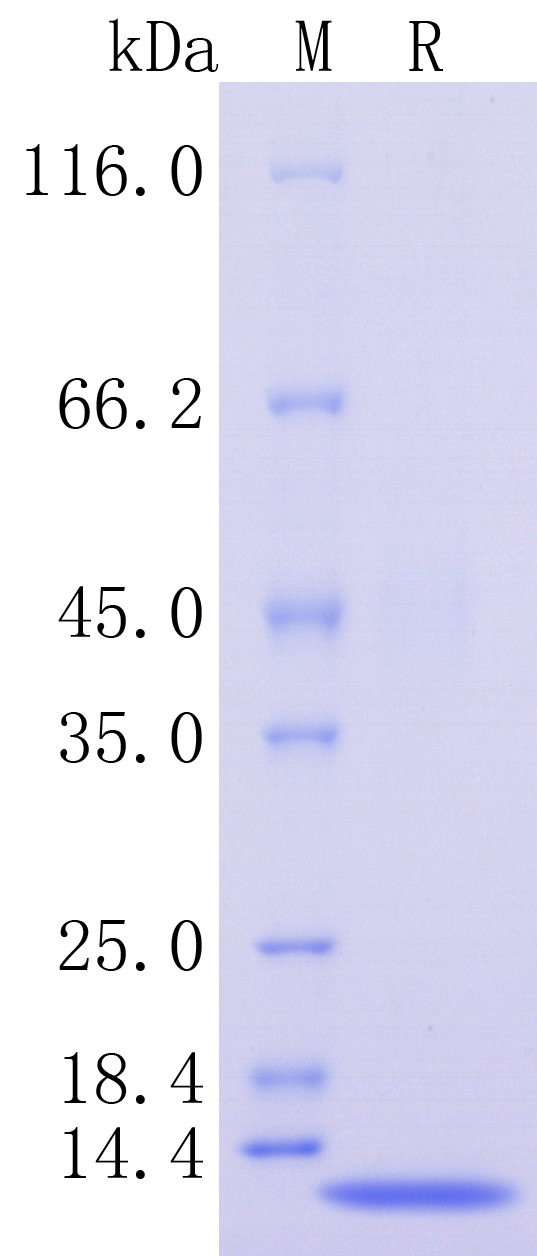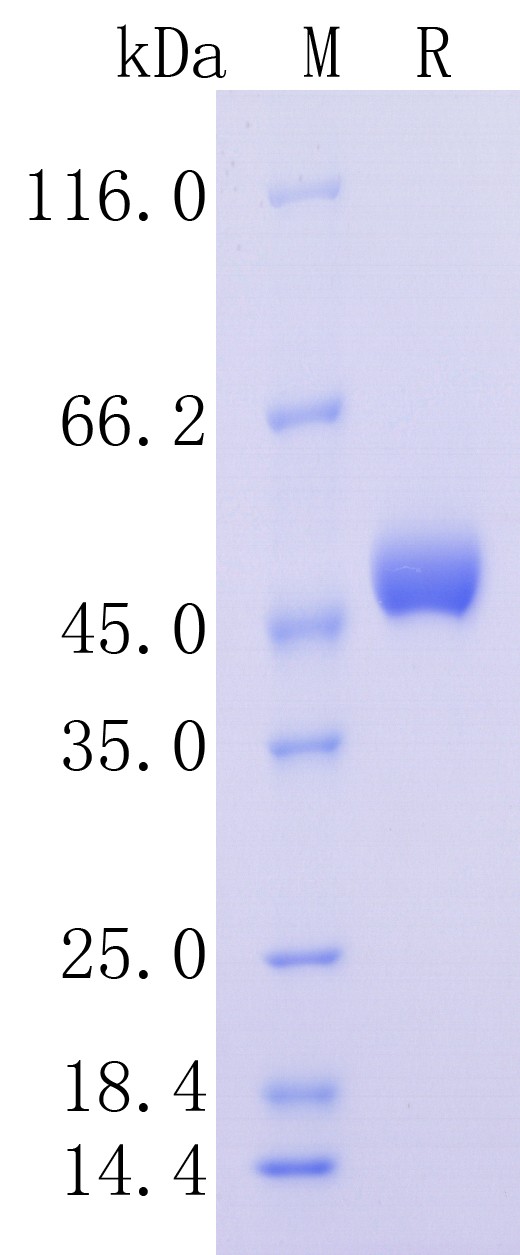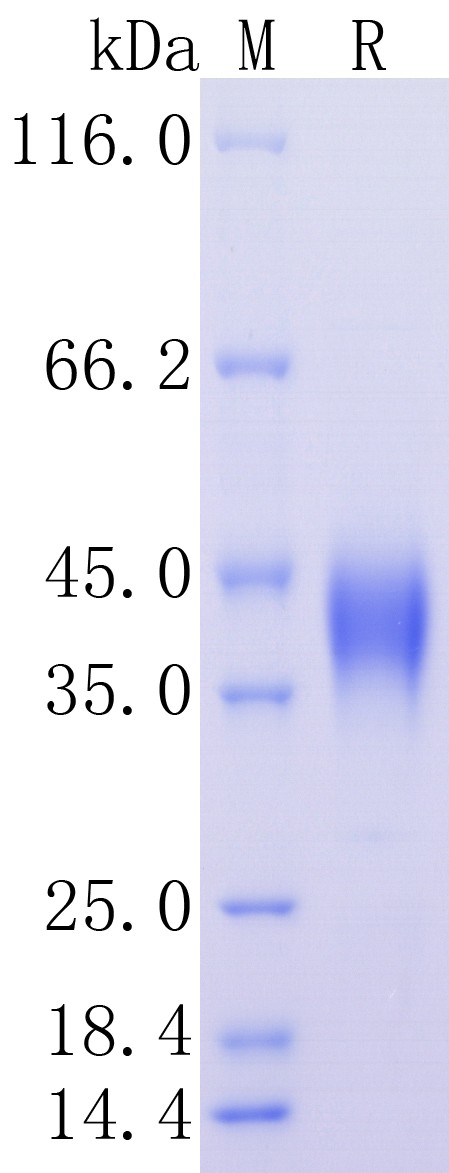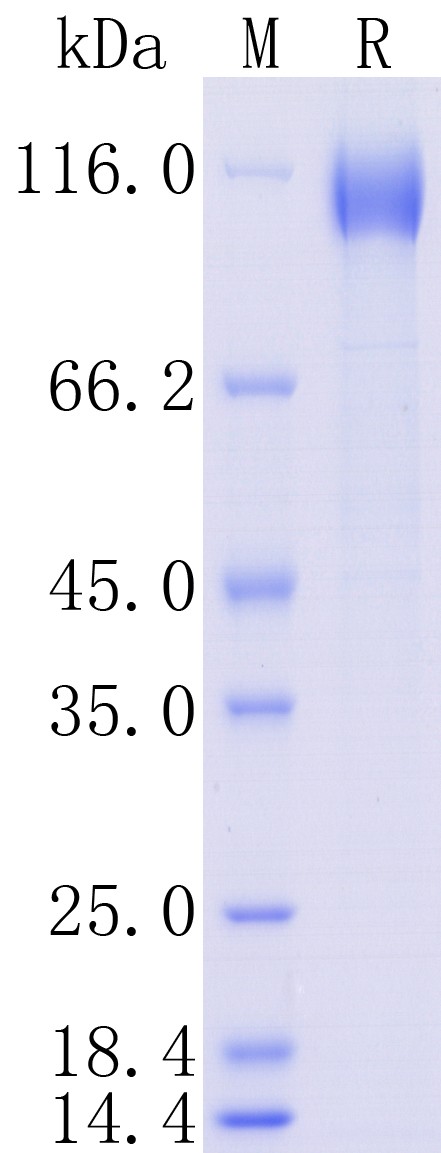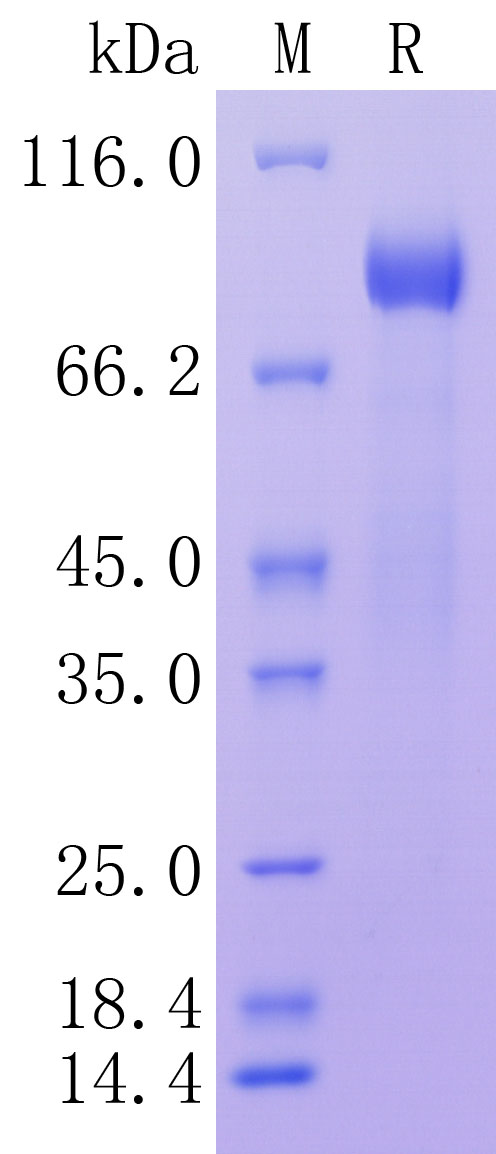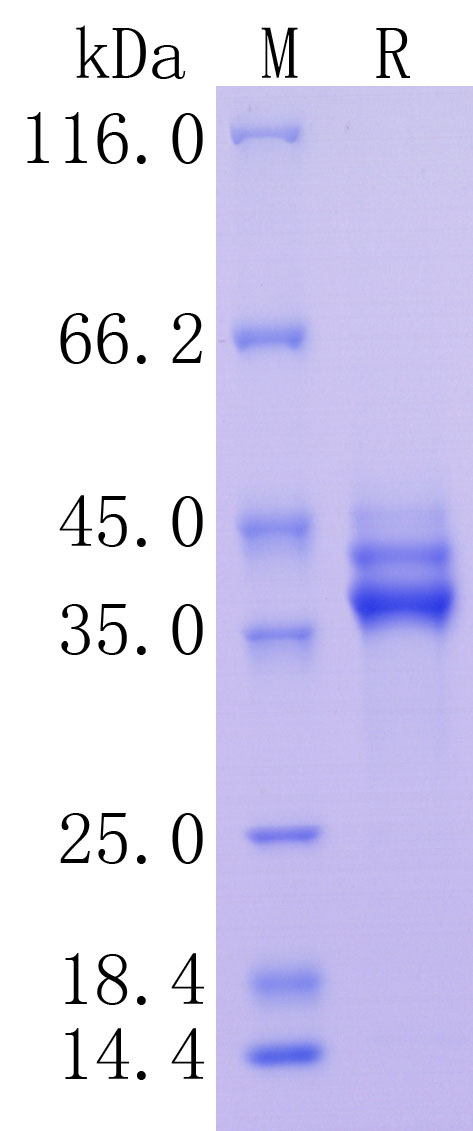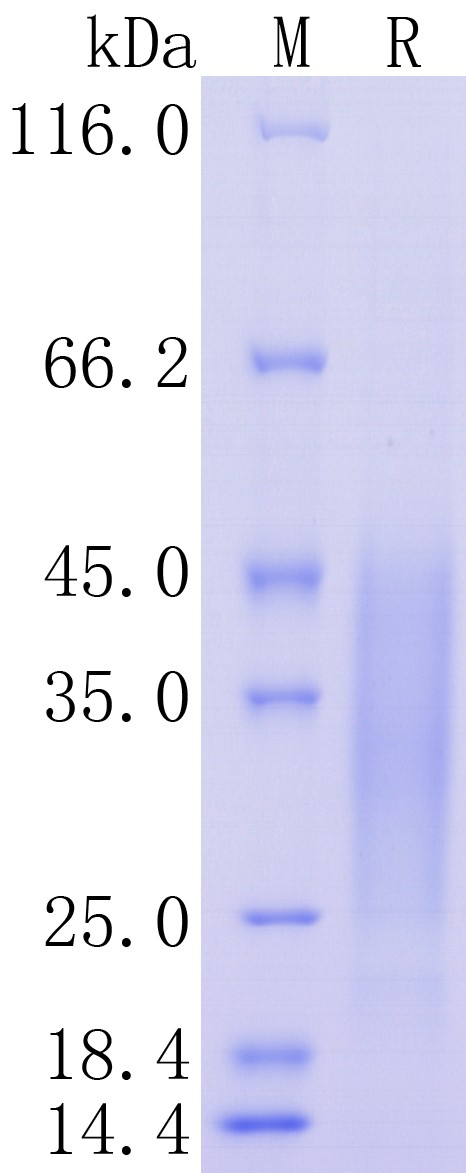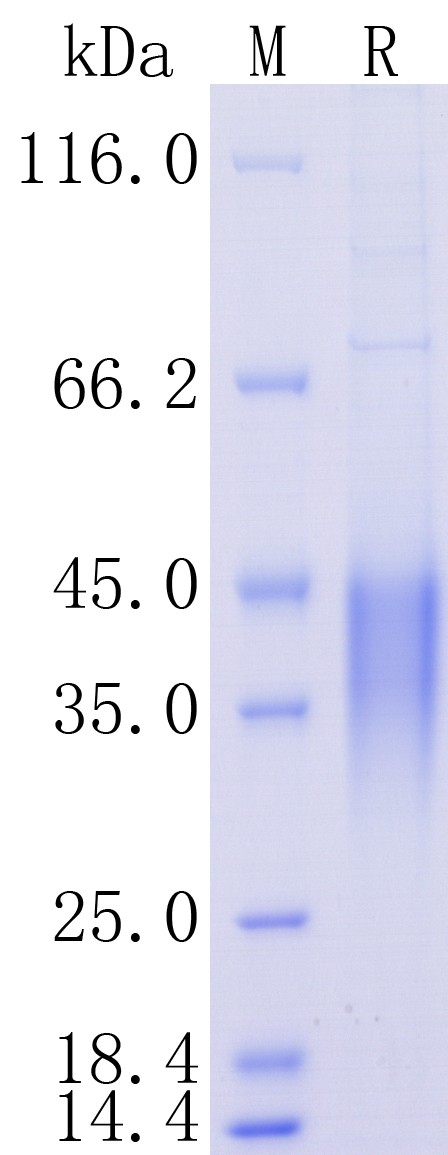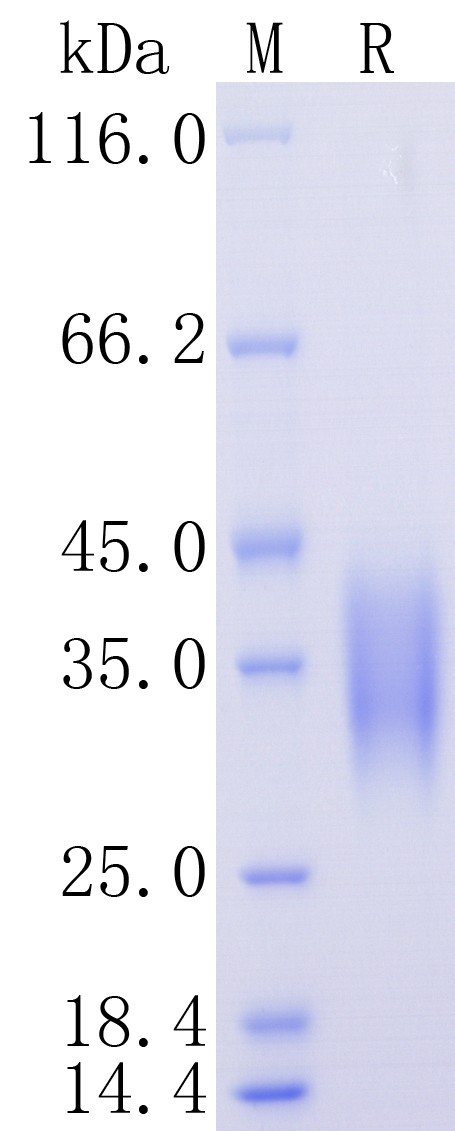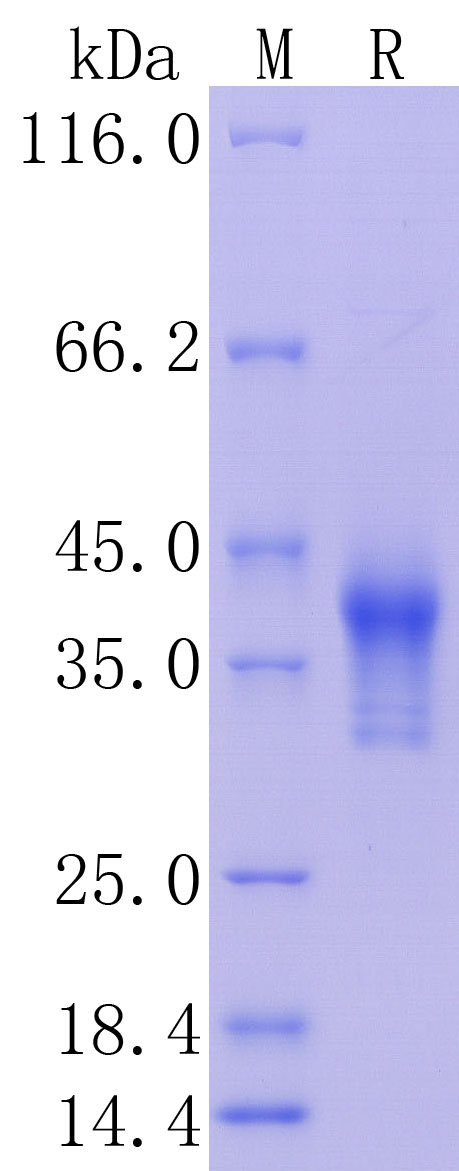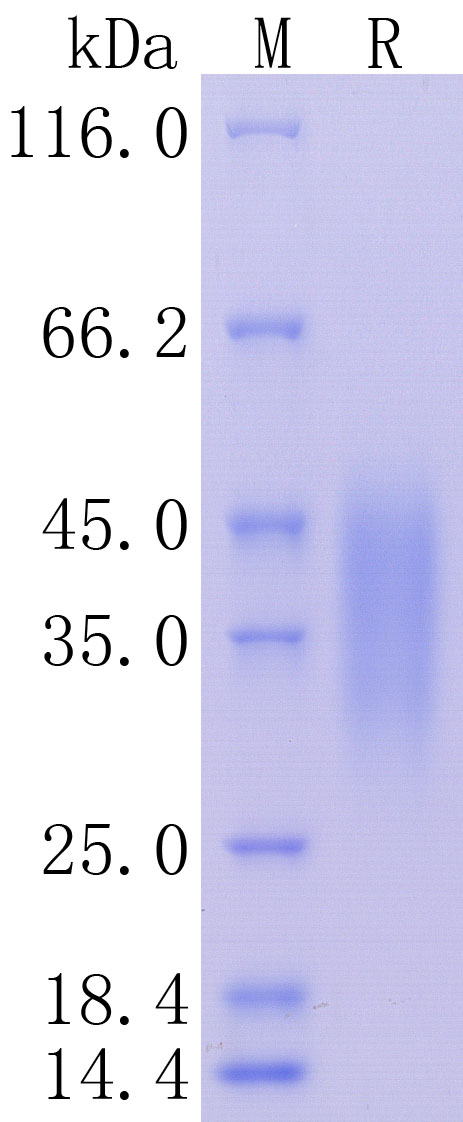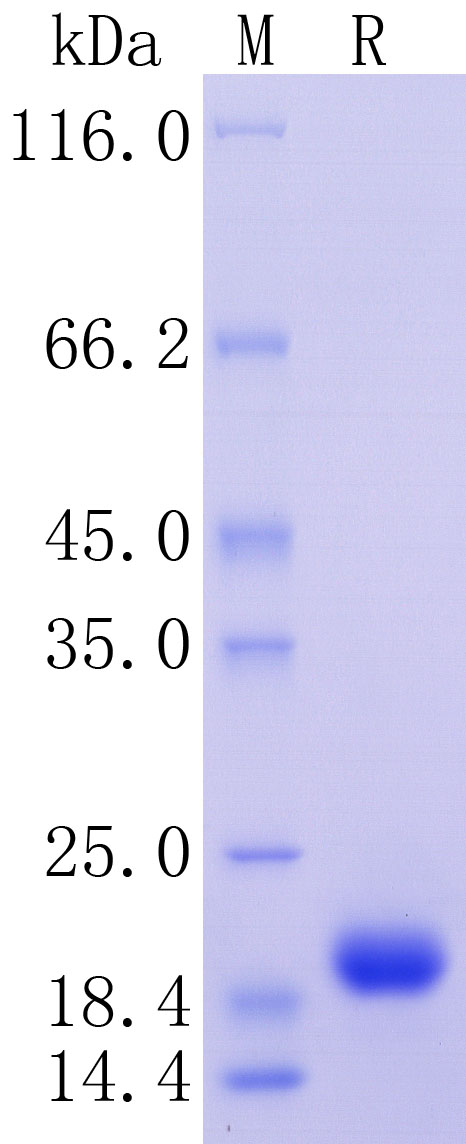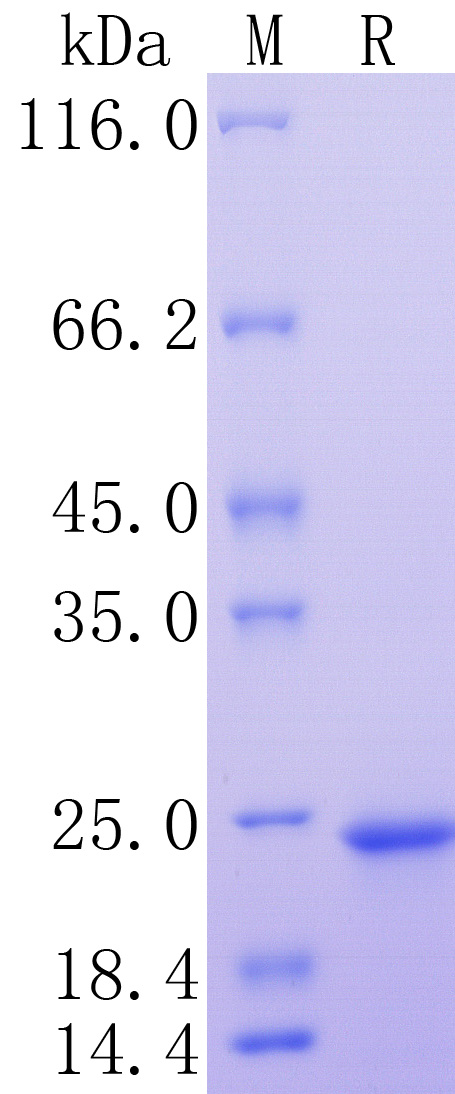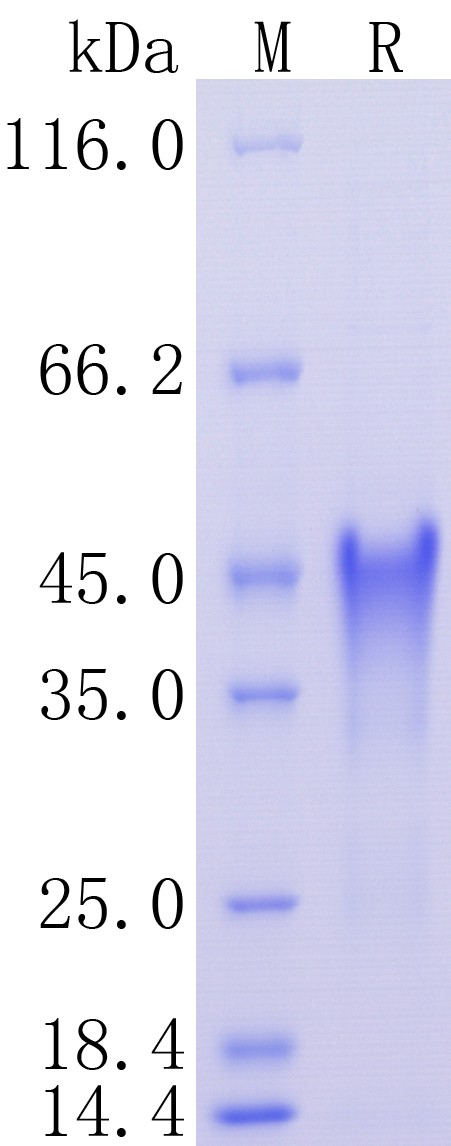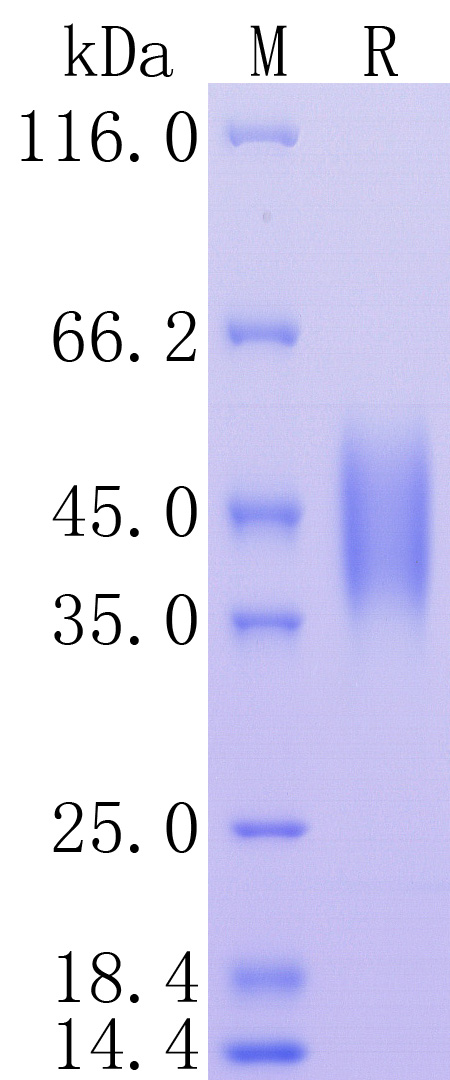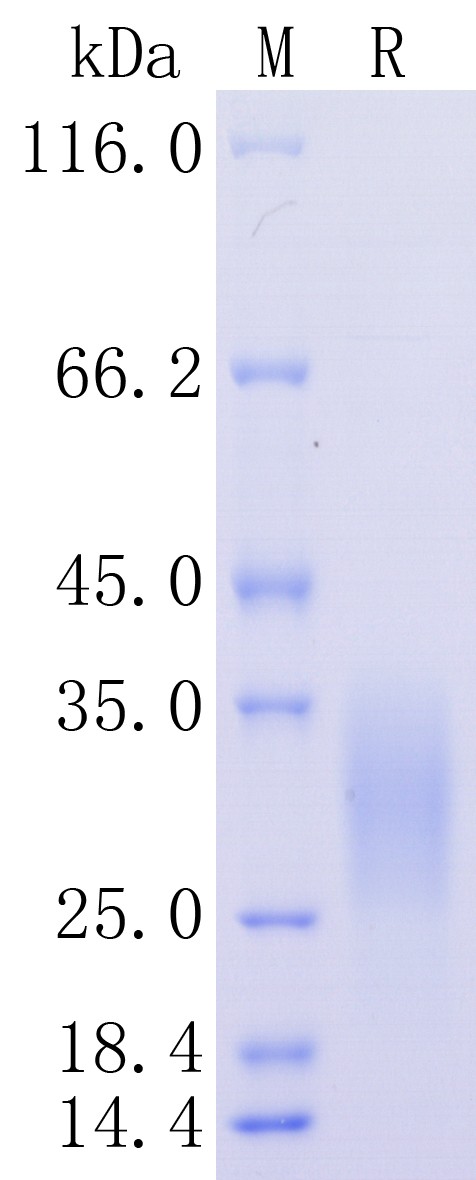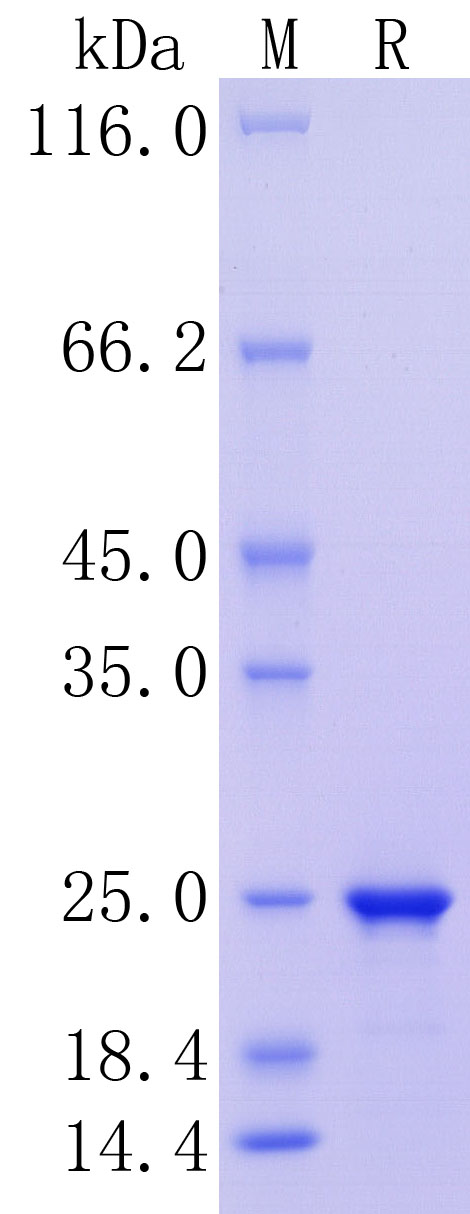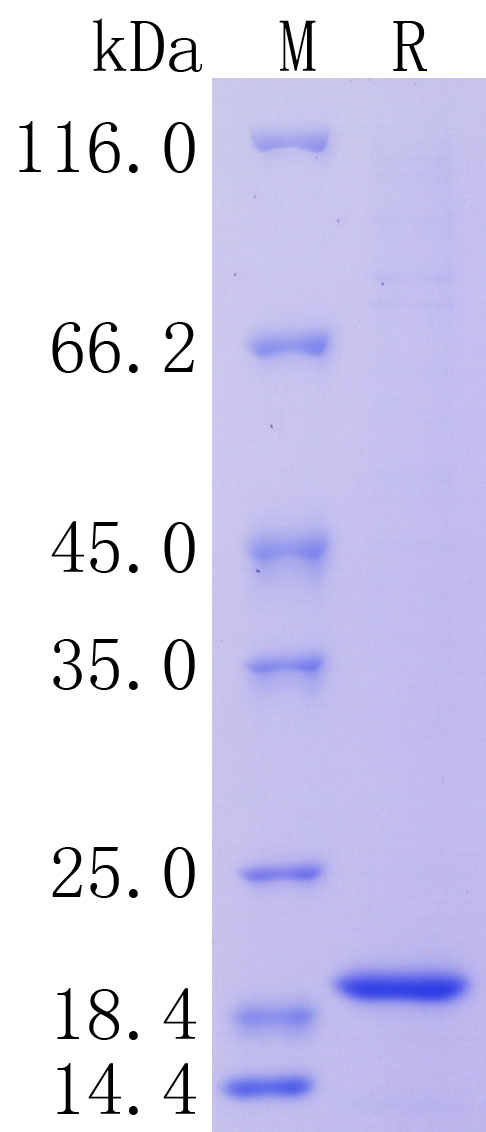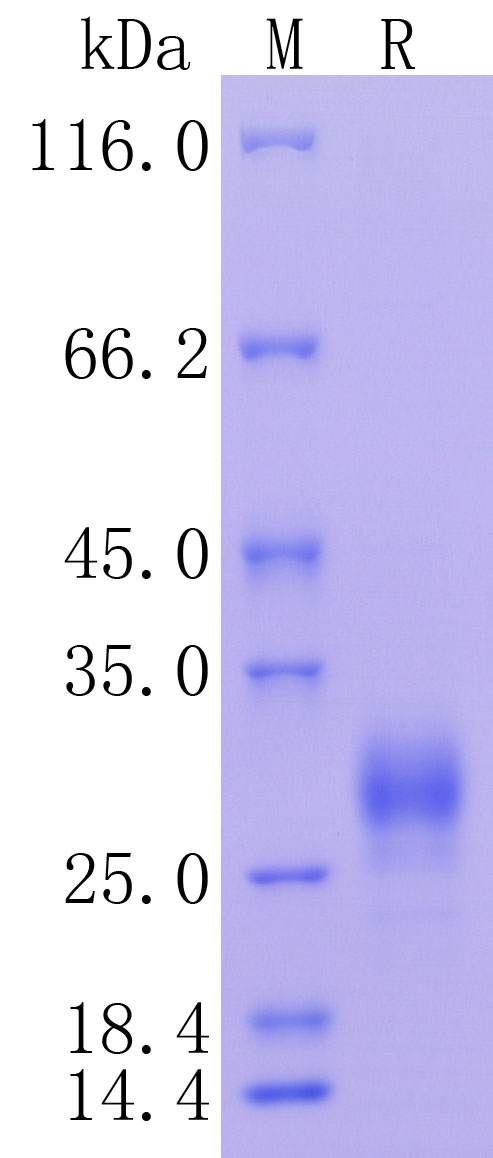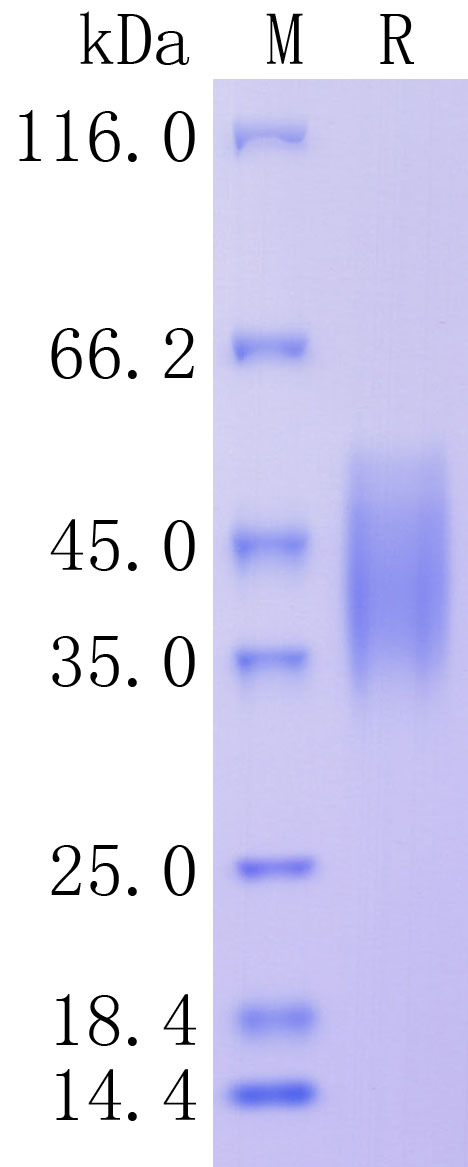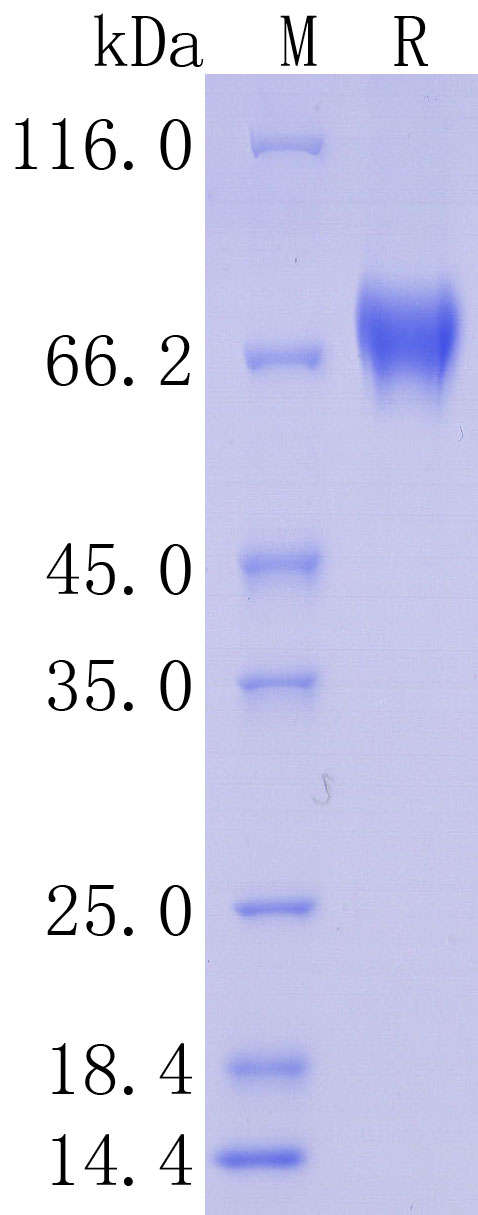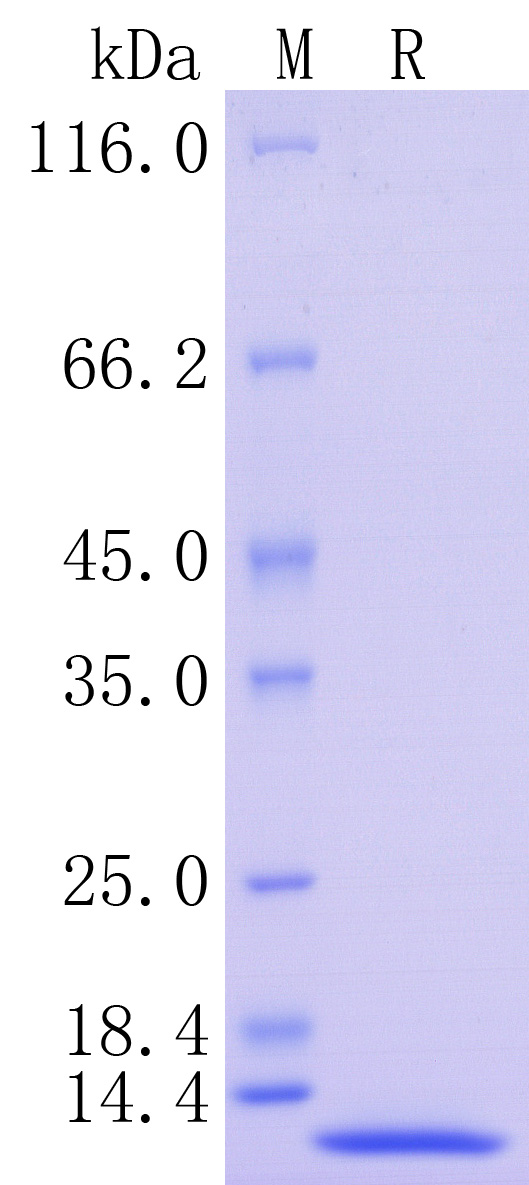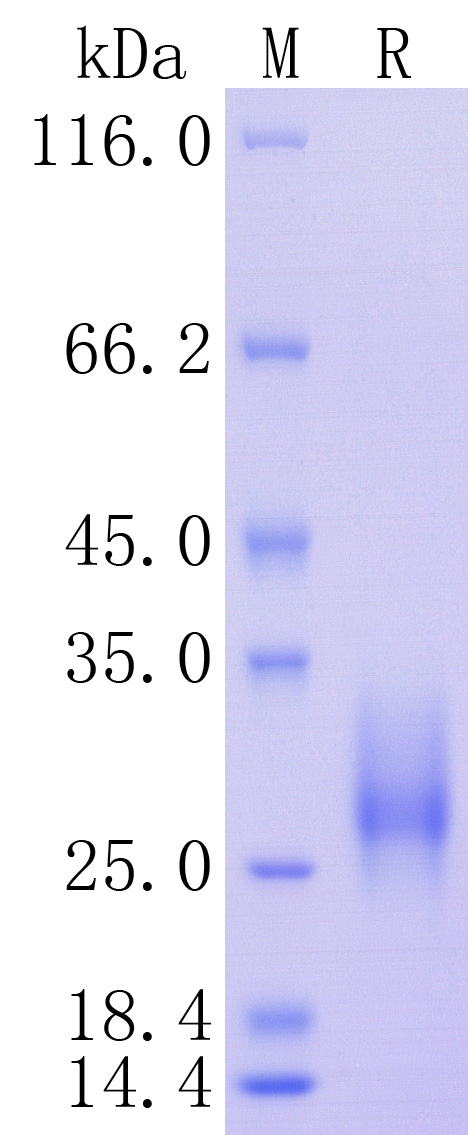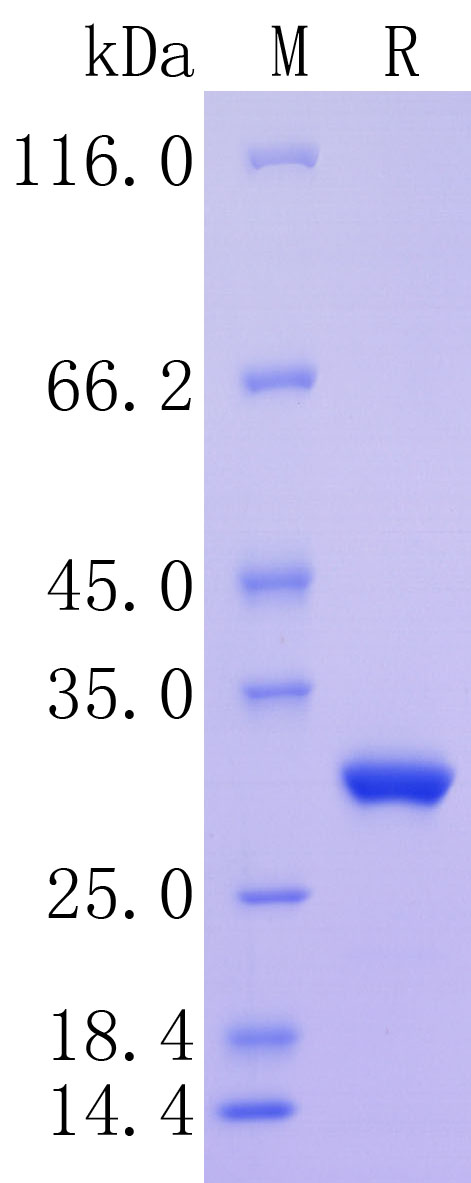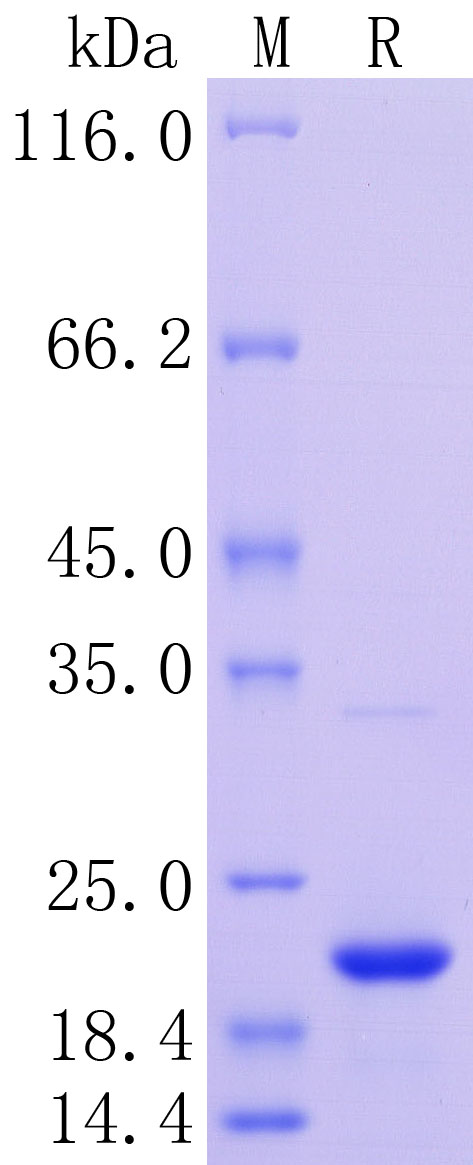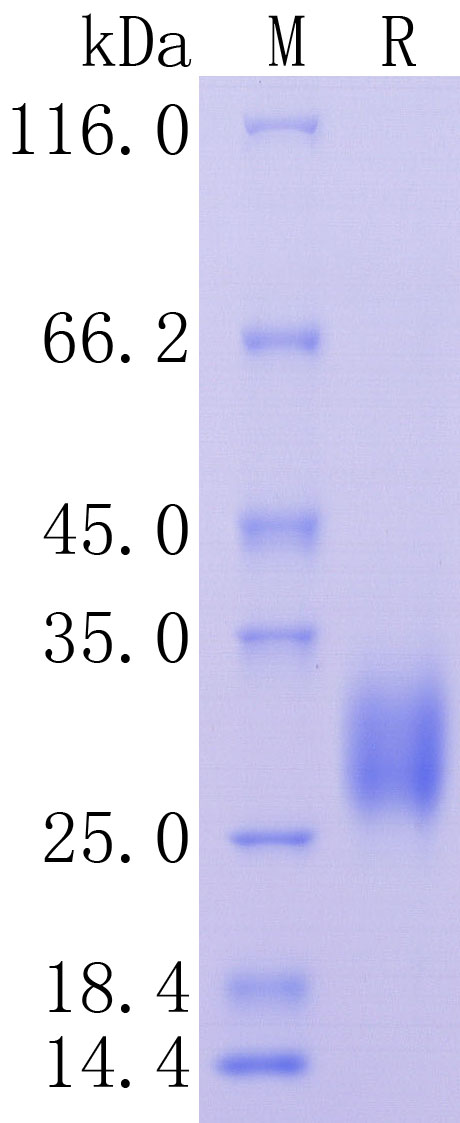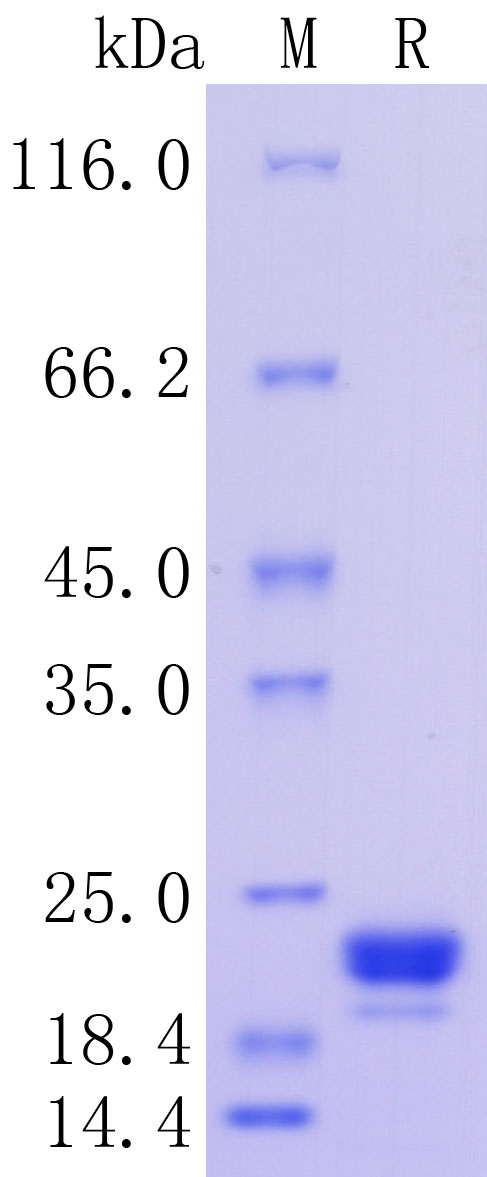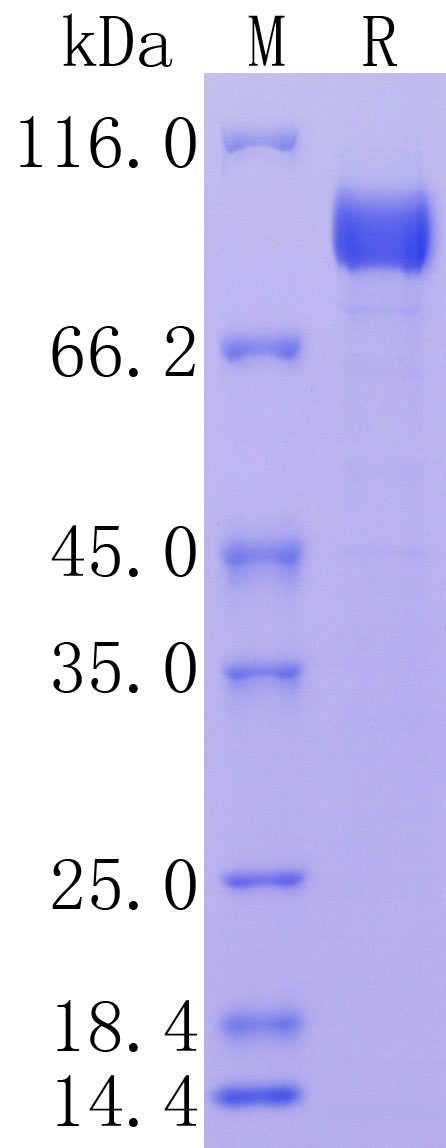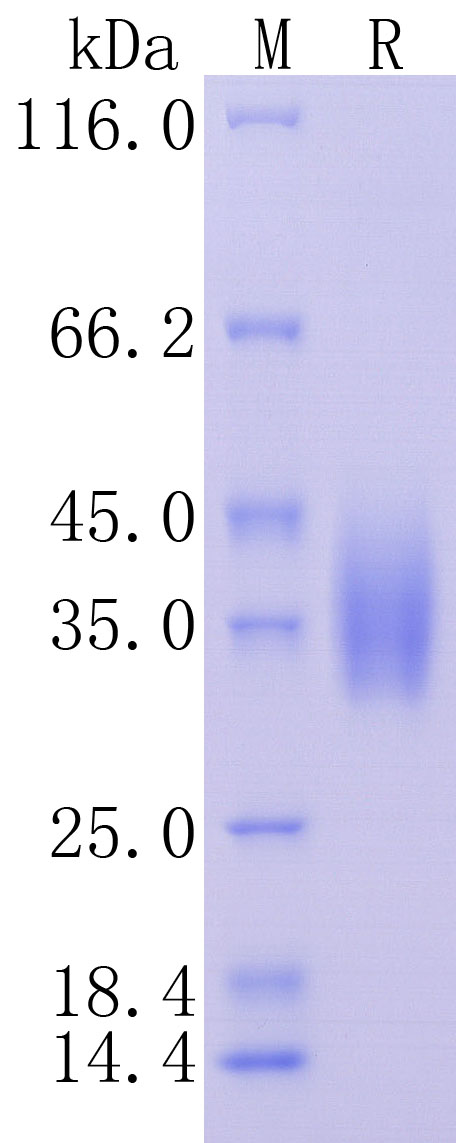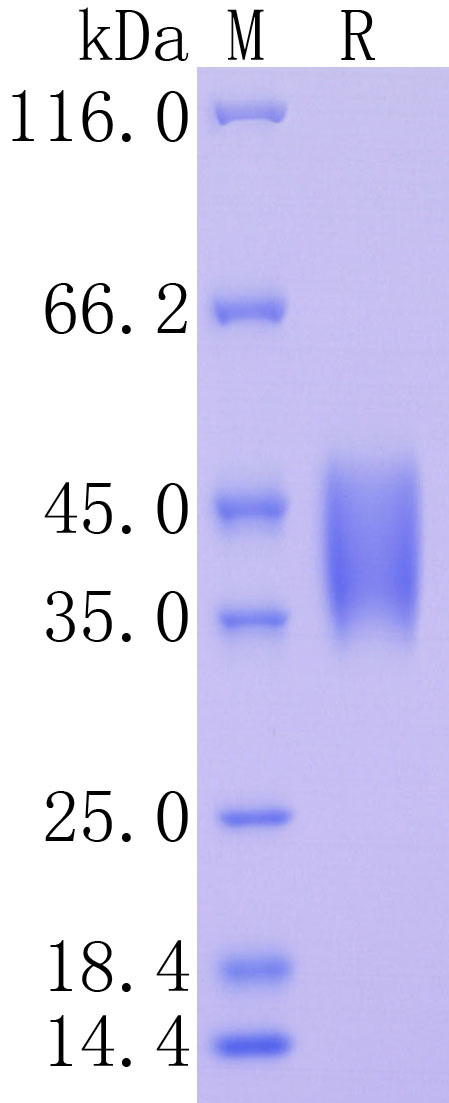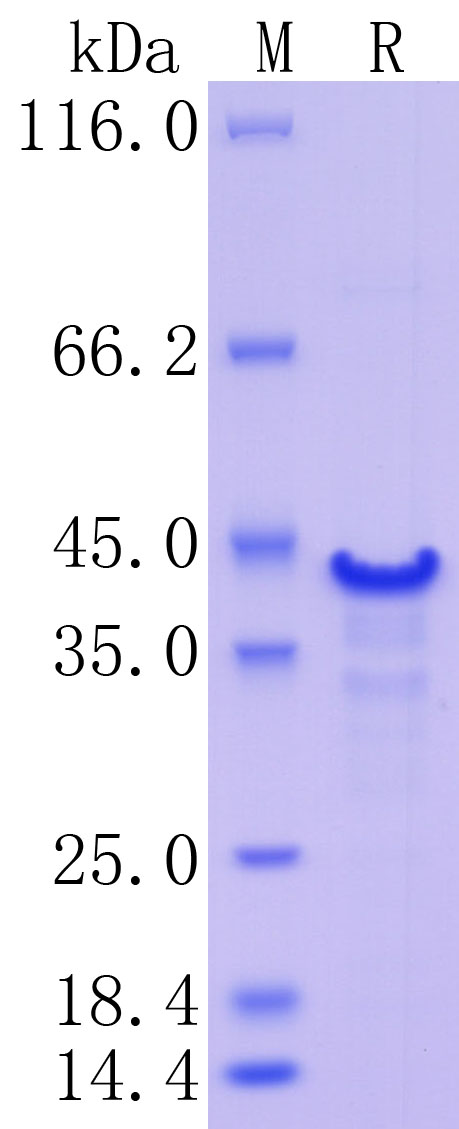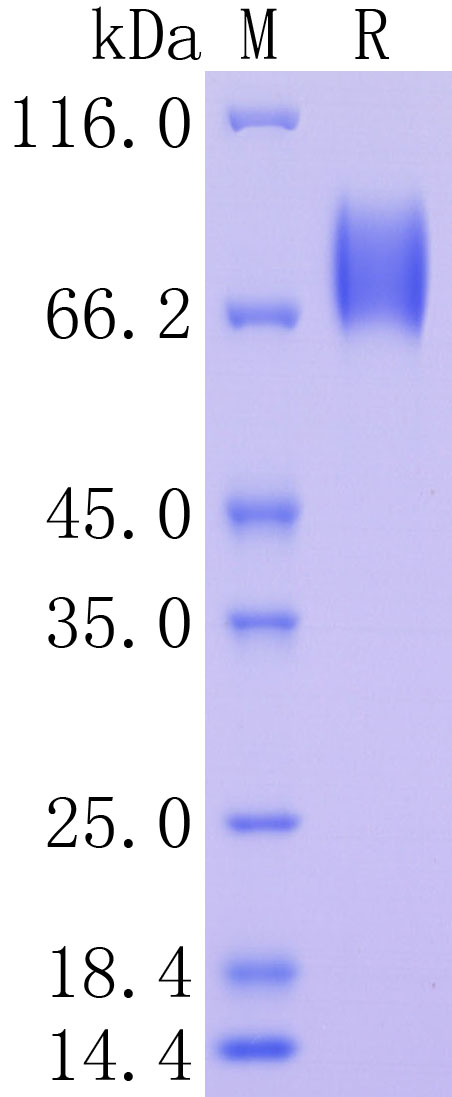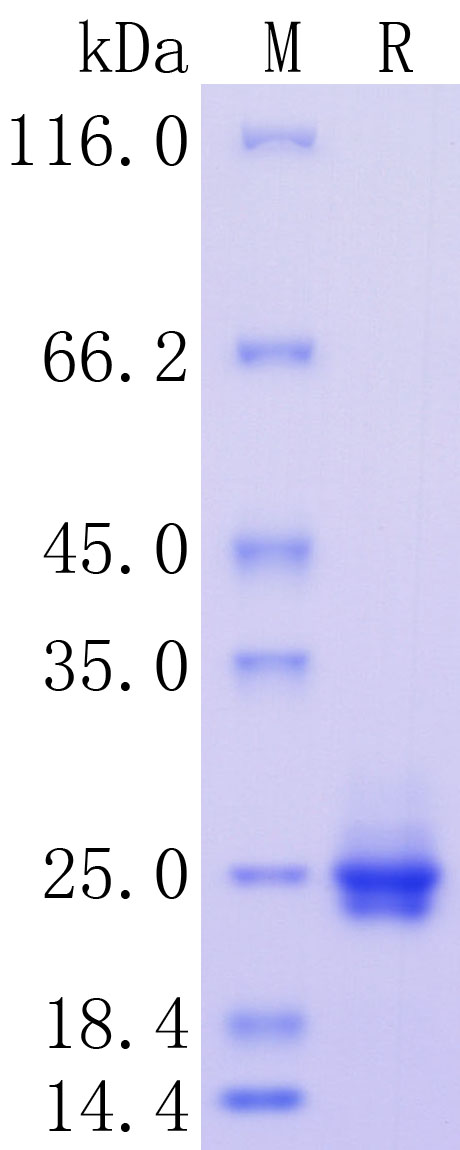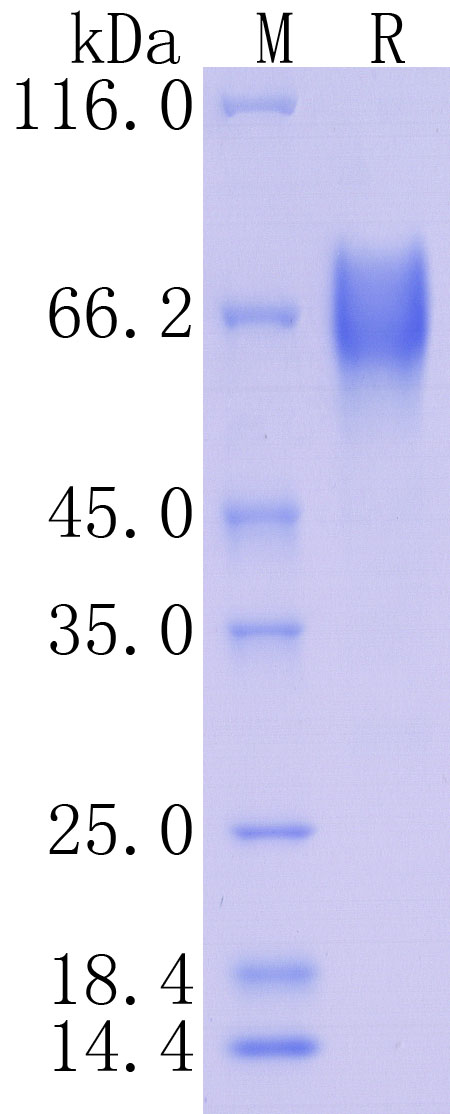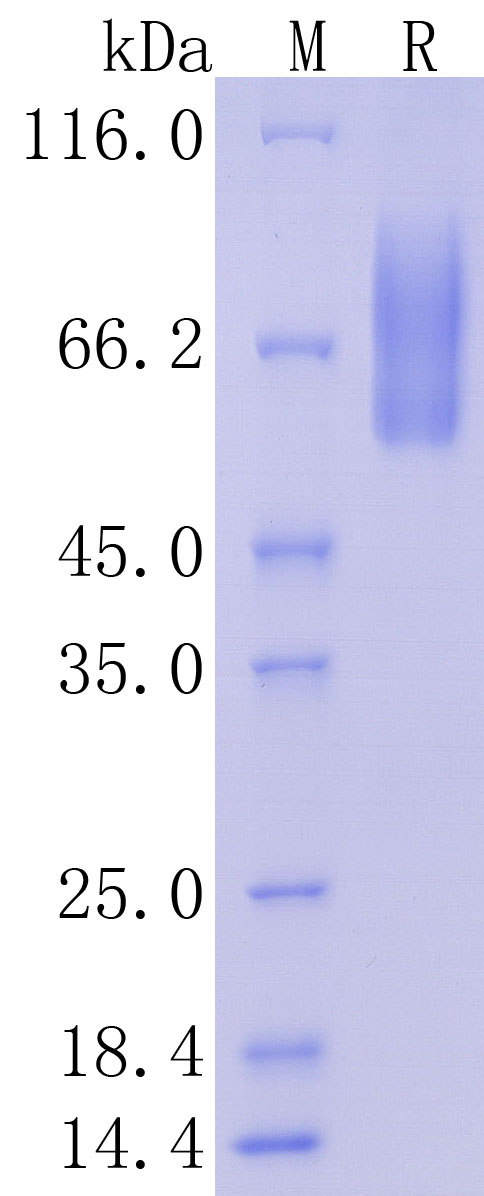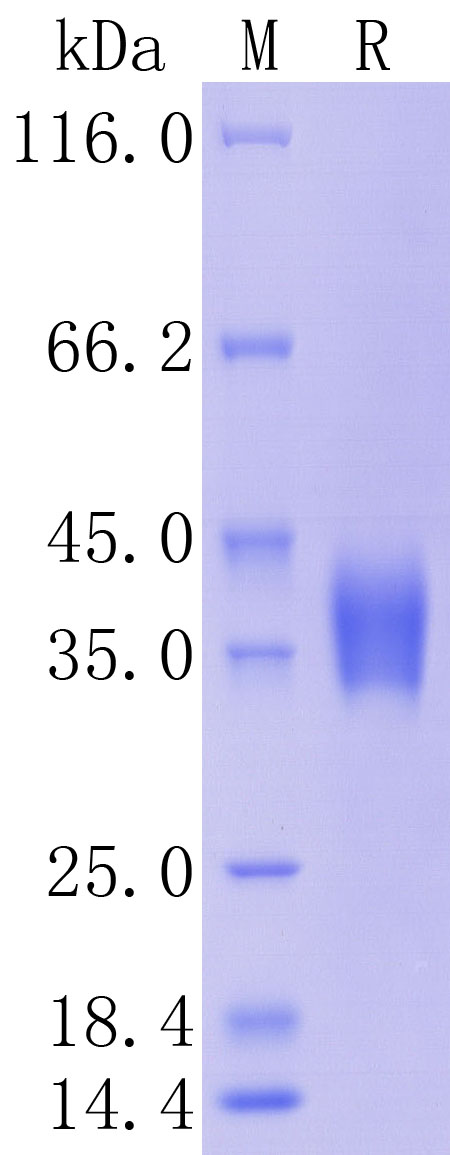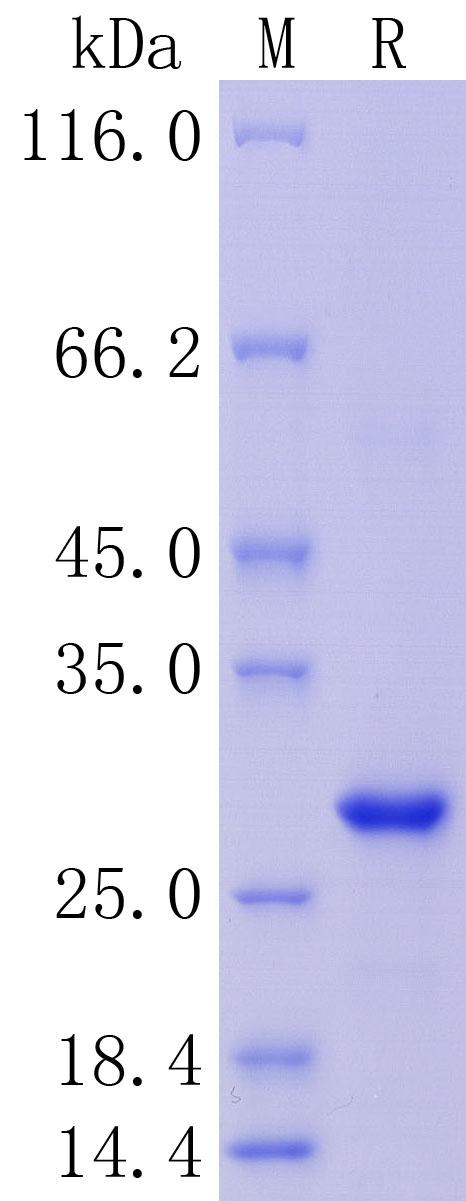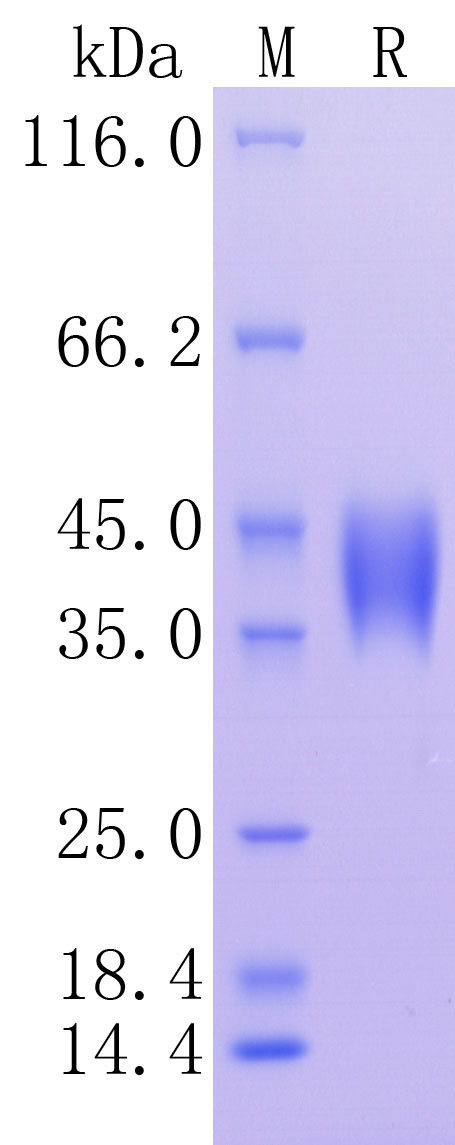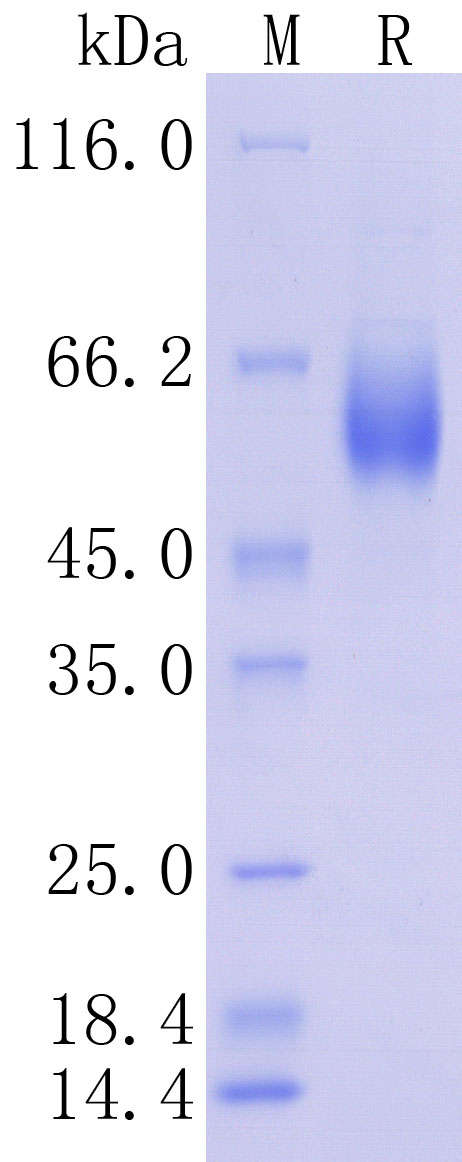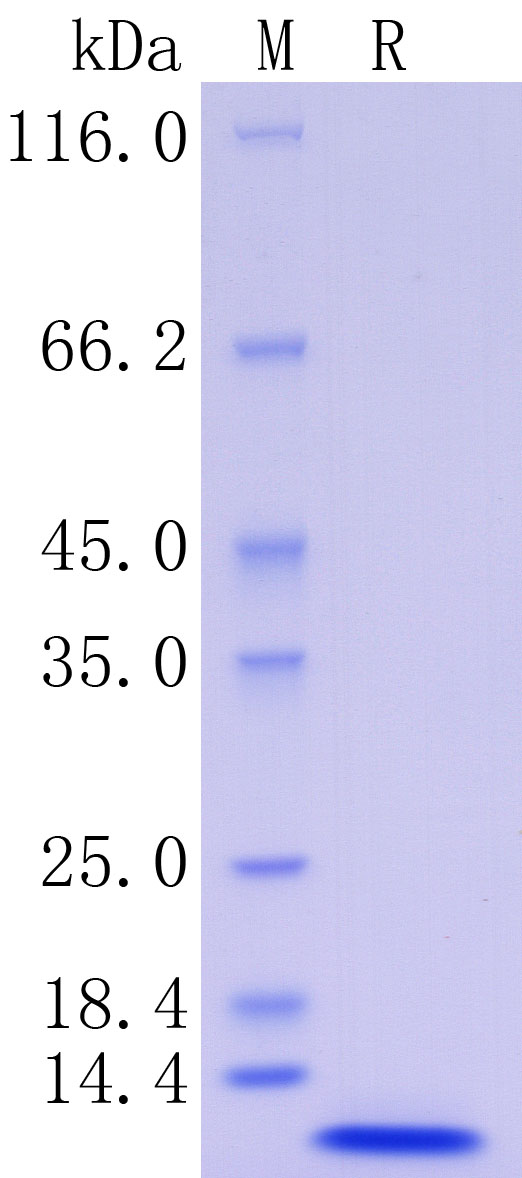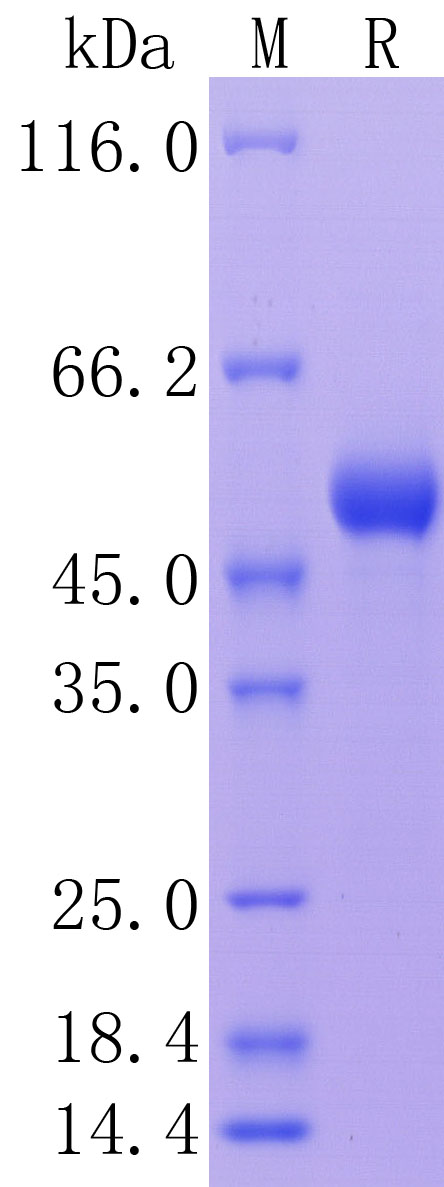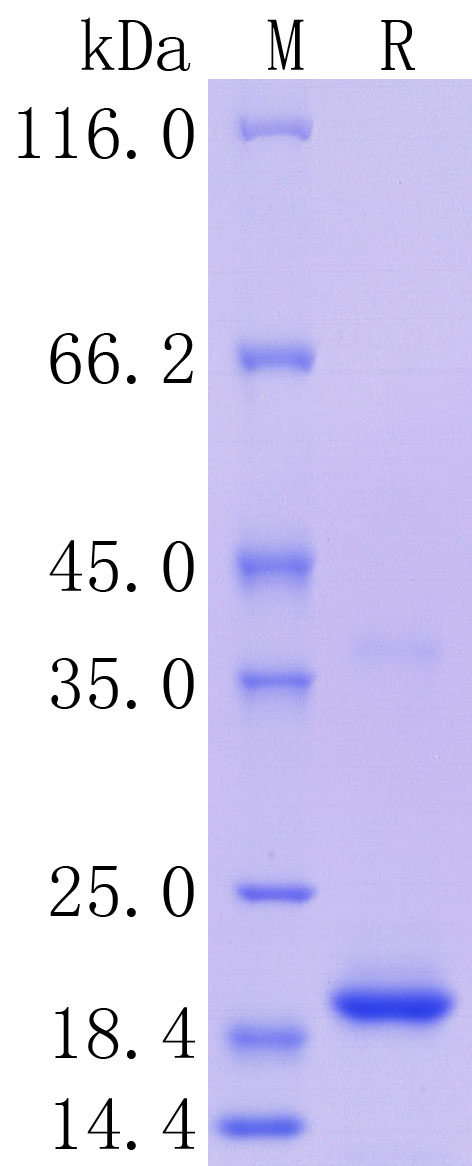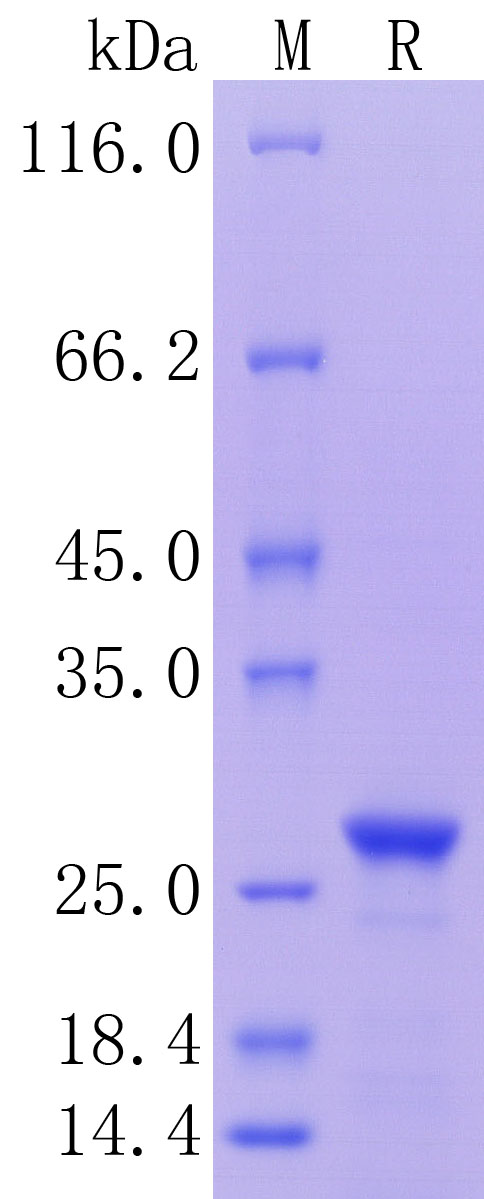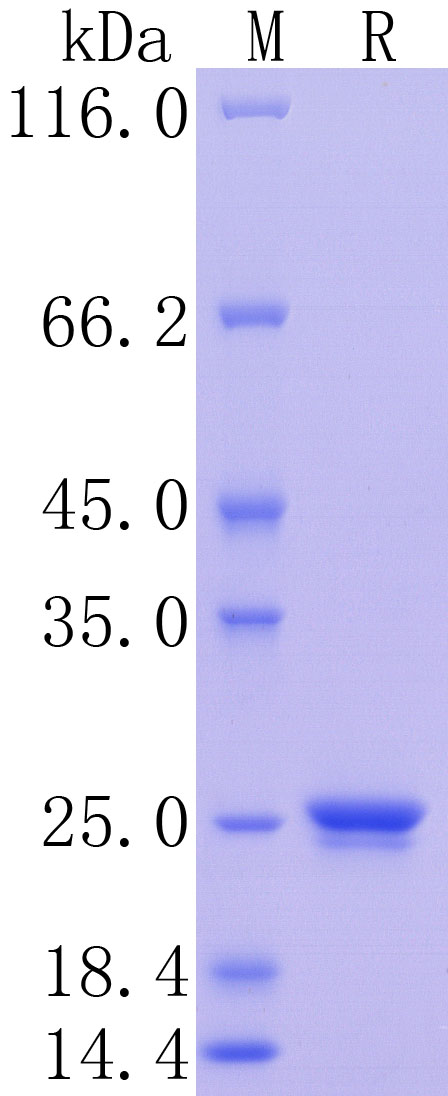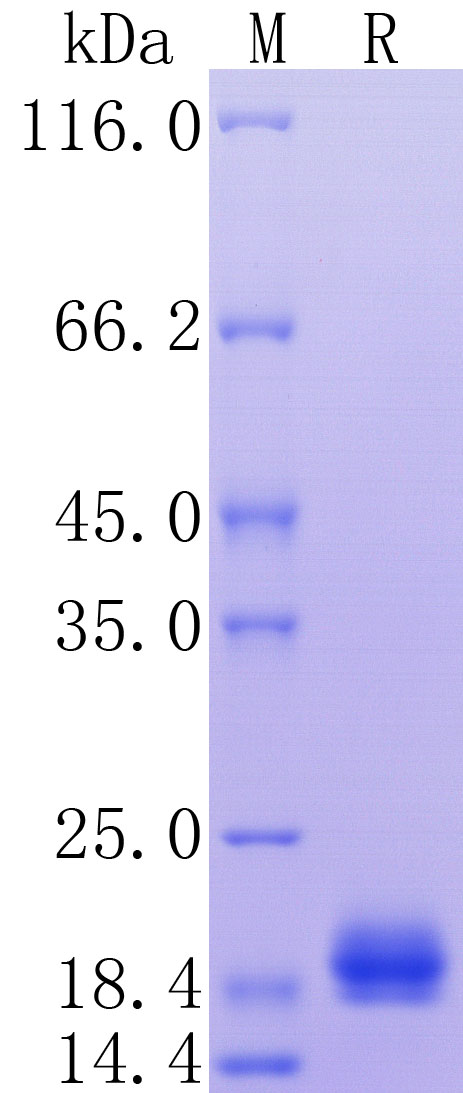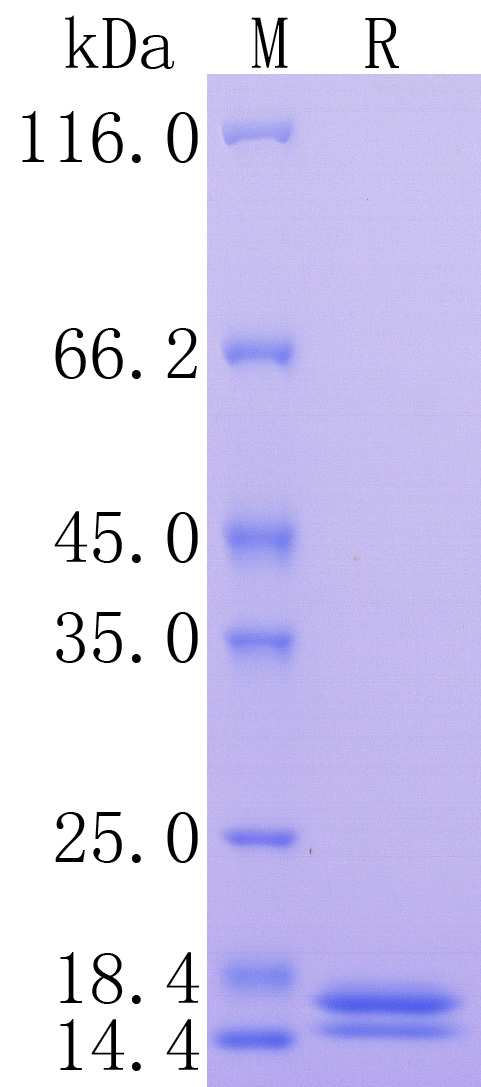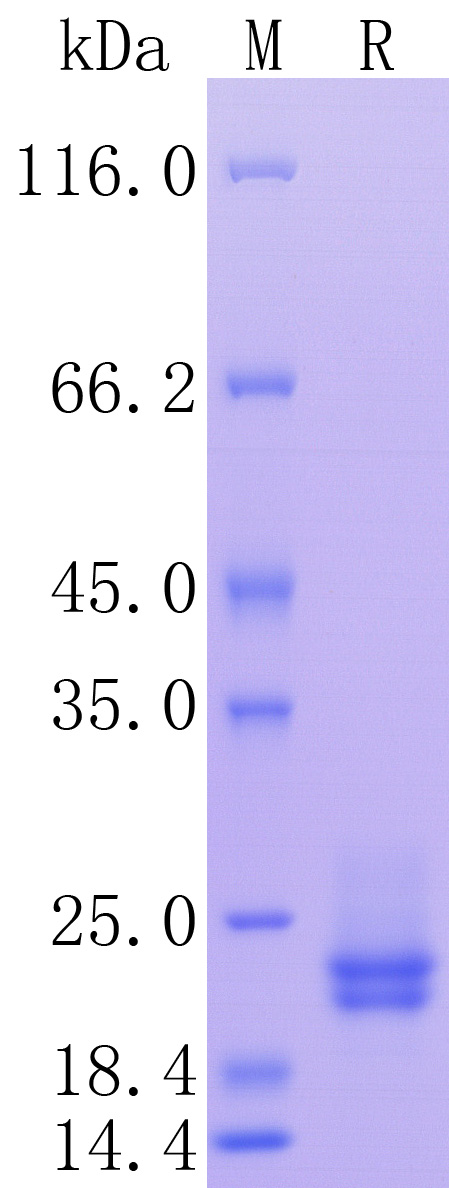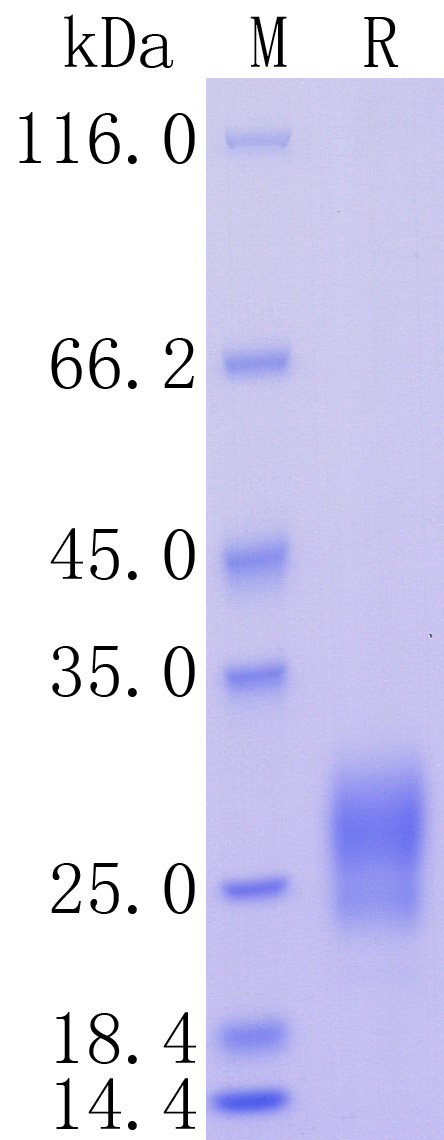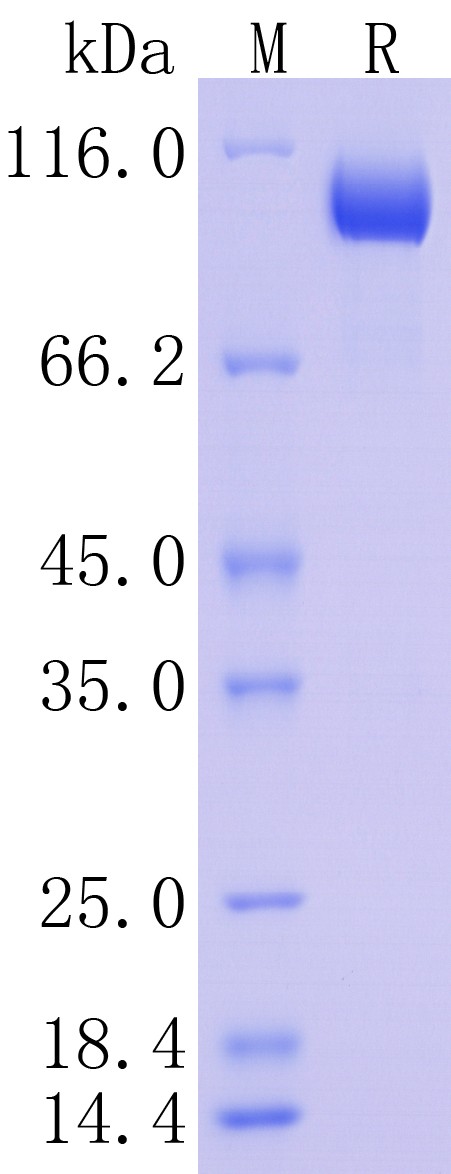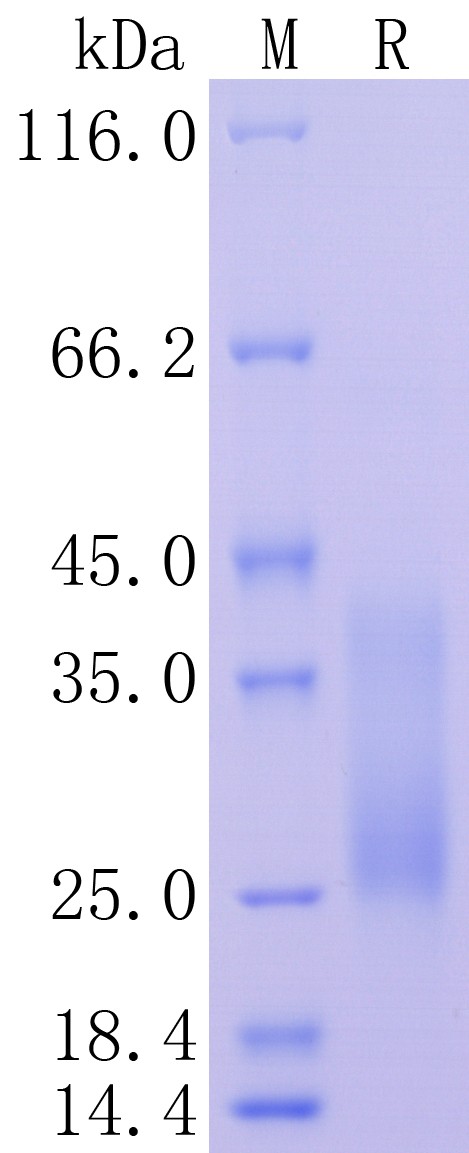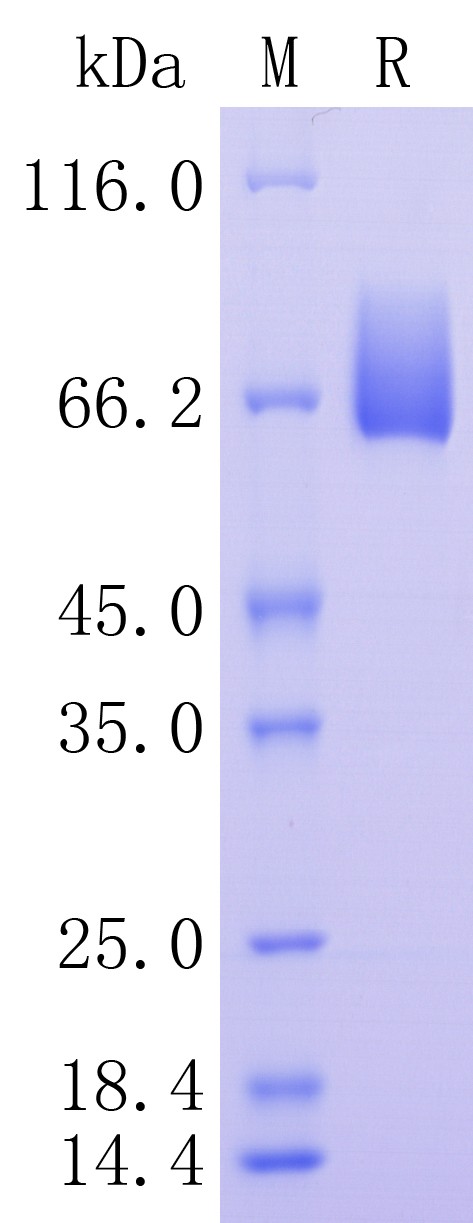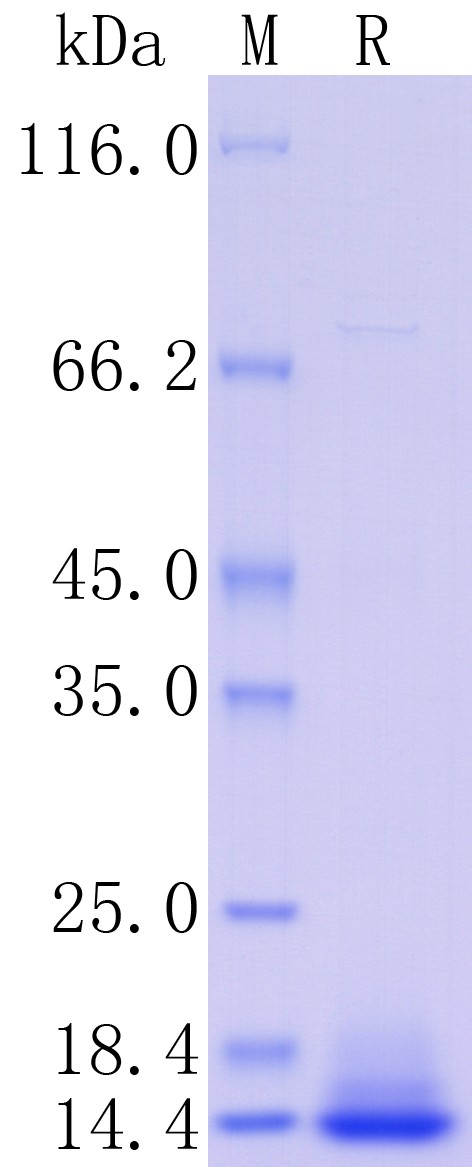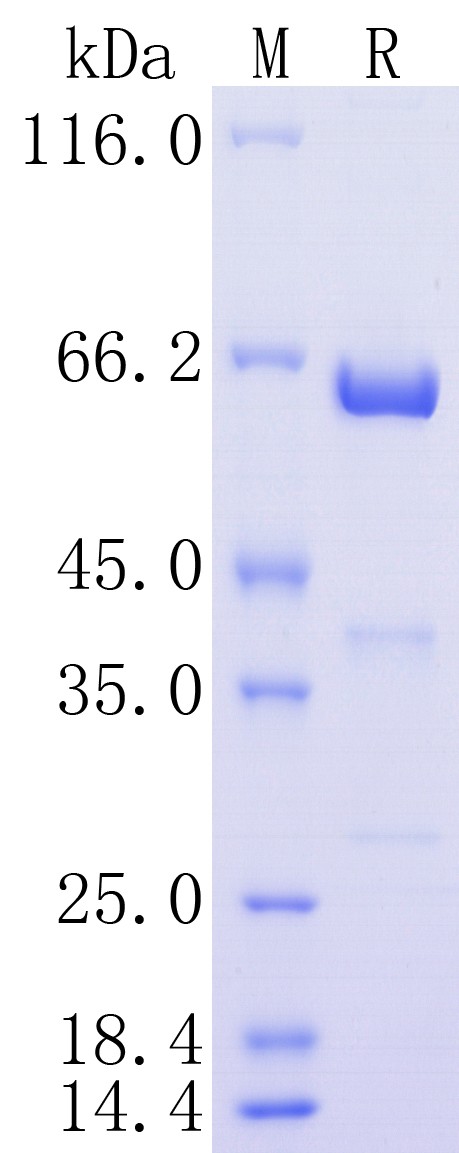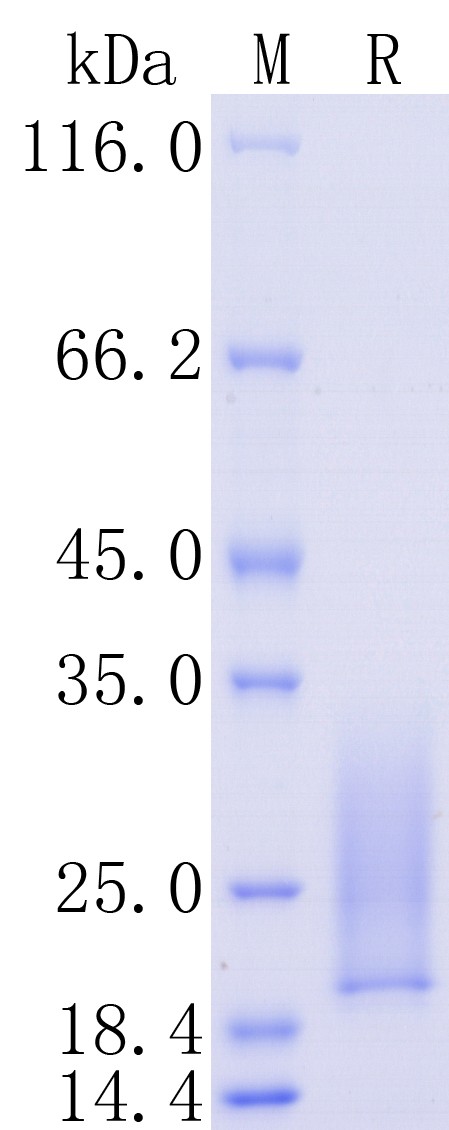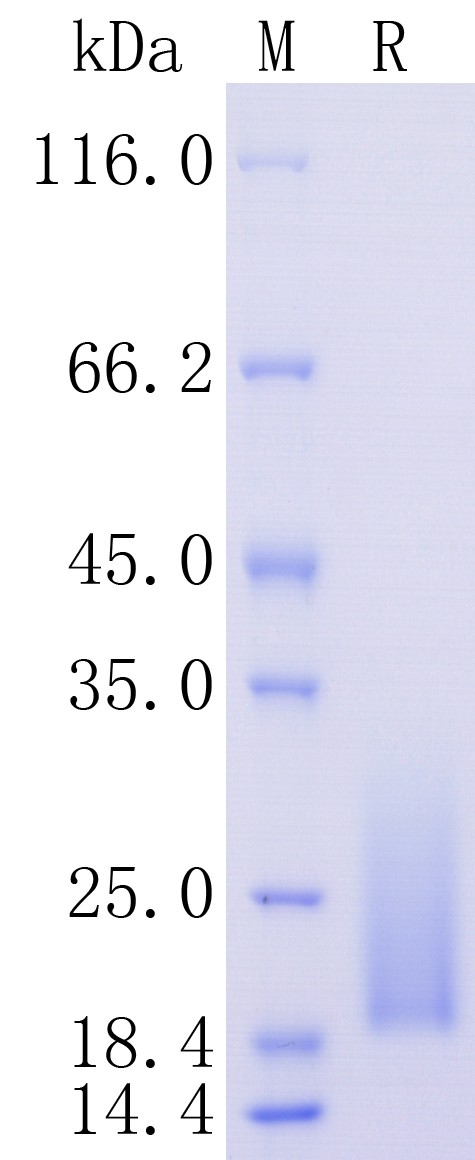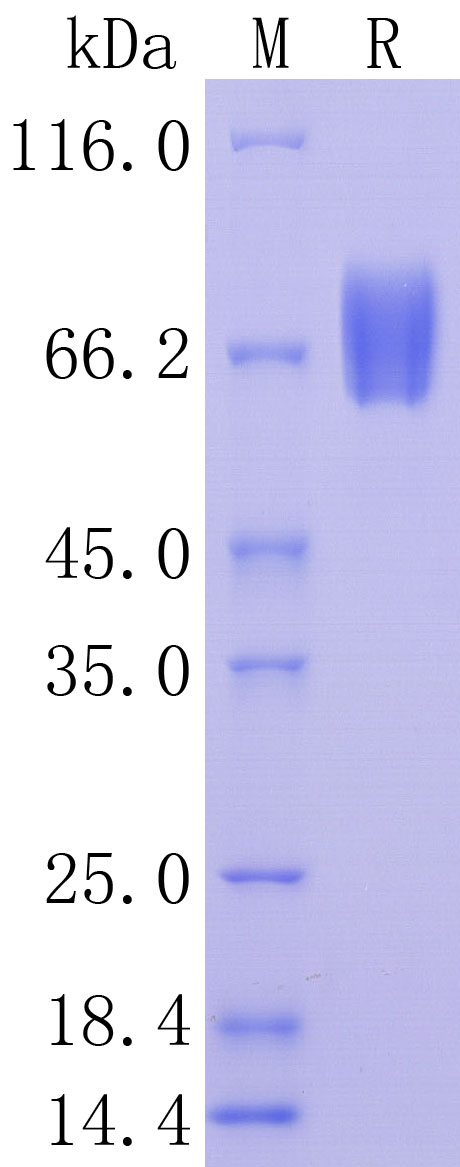Product Information
Product name
Human CEACAM-1/CD66a, C-His Tag (ECD)
Catalog No.
HA210526
Predicted molecular mass
44.7 kD
Protein construction description
A DNA sequence encoding the human CEACAM-1/CD66a protein (P13688) (Gln 35-Gly 428) was expressed with a His tag at the C-terminus.
Accession
P13688
Protein construction
Source
HEK293
Bio Activity
Testing in progress.
Purity
>95% as determined by SDS-PAGE.
Endotoxin
Less than 1.0 EU per μg by the LAL method.
Formulation
Lyophilized from a 0.2 μm filtered solution of PBS, pH7.4, 5% Trehalose, 5% mannitol.
Species
Human
Background
Carcinoembryonic antigen-related cell adhesion molecule 1 (biliary glycoprotein) (CEACAM1) also known as CD66a (Cluster of Differentiation 66a), is a human glycoprotein, and a member of the carcinoembryonic antigen (CEA) gene family. This gene encodes a member of the carcinoembryonic antigen (CEA) gene family, which belongs to the immunoglobulin superfamily. Two subgroups of the CEA family, the CEA cell adhesion molecules and the pregnancy-specific glycoproteins, are located within a 1.2 Mb cluster on the long arm of chromosome 19. Eleven pseudogenes of the CEA cell adhesion molecule subgroup are also found in the cluster. The encoded protein was originally described in bile ducts of liver as biliary glycoprotein. Subsequently, it was found to be a cell–cell adhesion molecule detected on leukocytes, epithelia, and endothelia. The encoded protein mediates cell adhesion via homophilic as well as heterophilic binding to other proteins of the subgroup. Multiple cellular activities have been attributed to the encoded protein, including roles in the differentiation and arrangement of tissue three-dimensional structure, angiogenesis, apoptosis, tumor suppression, metastasis, and the modulation of innate and adaptive immune responses. Multiple transcript variants encoding different isoforms have been reported, but the full-length nature of only two has been determined. In melanocytic cells CEACAM1 gene expression may be regulated by MITF.
Usage guide
Shipping
In general, recombinant proteins are provided as lyophilized powder which are shipped with blue ice. Bulk packages of recombinant proteins are provided as frozen liquid which are shipped with dry ice.
Storage
Please avoid repeated freeze-thaw cycles. Samples are stable for up to twelve months from date of receipt at -20℃ to -80℃ It is recommended that aliquot the reconstituted solution to minimize freeze-thaw cycles.
Reconstitution
Reconstitute at 250 μg/ml in sterile water.
同靶点&同通路的产品
Human CXCL5, Tag Free
Application:
Reactivity: Human
Conjugate:
Human CYLD, C-His Tag
Application:
Reactivity: Human
Conjugate:
Human NCAM1/CD56, Tag Free (ECD)
Application:
Reactivity: Human
Conjugate:
Human IL-2, C-His Tag
Application:
Reactivity: Human
Conjugate:
Human BAFF/BLyS/TNFSF13B, Tag Free (ECD)
Application:
Reactivity: Human
Conjugate:
Human MAPK12, C-His Tag
Application:
Reactivity: Human
Conjugate:
Human IFN-gamma R1, C-His Tag (ECD)
Application:
Reactivity: Human
Conjugate:
Human CD272/BTLA, C-His, Flag Tag (ECD)
Application:
Reactivity: Human
Conjugate:
Human CD2, C-His, Flag Tag (ECD)
Application:
Reactivity: Human
Conjugate:
Human HVEM/TNFRSF14, C-Flag Tag
Application:
Reactivity: Human
Conjugate:
Human LAIR1, N-Twin Strep, C-His, Flag Tag
Application:
Reactivity: Human
Conjugate:
Human IL2RG/CD132, C-His Tag (ECD)
Application:
Reactivity: Human
Conjugate:
Human MAPK6, C-His Tag
Application:
Reactivity: Human
Conjugate:
Human ICOS Ligand/B7-H2/ICOSLG, C-His Tag (ECD)
Application:
Reactivity: Human
Conjugate:
Human IL-5, C-His Tag
Application:
Reactivity: Human
Conjugate:
Human TRAF3, C-His Tag
Application:
Reactivity: Human
Conjugate:
Human IL-1 alpha/IL1A, C-His, Flag Tag
Application:
Reactivity: Human
Conjugate:
Human IL-8/CXCL8 Tag Free
Application:
Reactivity: Human
Conjugate:
Human Interferon alpha-2/IFNA2, C-His Tag
Application:
Reactivity: Human
Conjugate:
Human IL-1 RII, C-His Tag (ECD)
Application:
Reactivity: Human
Conjugate:
Human IL-22, C-His, Flag Tag
Application:
Reactivity: Human
Conjugate:
Human PRDM1, N-Twin Strep, C-His, Flag Tag
Application:
Reactivity: Human
Conjugate:
Human IL-4R, C-His, Tag (ECD)
Application:
Reactivity: Human
Conjugate:
Human CXCL10, C-Flag Tag
Application:
Reactivity: Human
Conjugate:
Human TNF-alpha, Tag Free
Application:
Reactivity: Human
Conjugate:
Human TNF-alpha, C-His Tag
Application:
Reactivity: Human
Conjugate:
Human CXCL9, Tag Free
Application:
Reactivity: Human
Conjugate:
Human IL-18, Tag Free
Application:
Reactivity: Human
Conjugate:
Human CCL2/MCP1, Tag Free
Application:
Reactivity: Human
Conjugate:
Human CD5, Tag Free (ECD)
Application:
Reactivity: Human
Conjugate:
Human IL1RA, C-His Tag
Application:
Reactivity: Human
Conjugate:
Human TREM1, C-Hia, Flag Tag
Application:
Reactivity: Human
Conjugate:
Human CTLA-4, C-His Tag
Application:
Reactivity: Human
Conjugate:
Human CD31/PECAM-1, C-His Tag
Application:
Reactivity: Human
Conjugate:
Human TRAIL/TNFSF10, C-His Tag
Application:
Reactivity: Human
Conjugate:
Human CCL17/TARC, Tag Free
Application:
Reactivity: Human
Conjugate:
Human IP-10/CXCL10, Tag Free
Application:
Reactivity: Human
Conjugate:
Human CXCL12/SDF-1, Tag Free
Application:
Reactivity: Human
Conjugate:
Human CCL3/MIP-1, Tag Free
Application:
Reactivity: Human
Conjugate:
Human CXCL2/GRO beta, Tag Free
Application:
Reactivity: Human
Conjugate:
Human Nectin-2, C-His Tag (ECD)
Application:
Reactivity: Human
Conjugate:
Human CD48, C-His Tag
Application:
Reactivity: Human
Conjugate:
Human IL-13, Tag Free
Application:
Reactivity: Human
Conjugate:
Human P-Selectin/CD62P, C-His Tag (ECD)
Application:
Reactivity: Human
Conjugate:
Human VE-cadherin, Tag Free (ECD)
Application:
Reactivity: Human
Conjugate:
Human IL12B/P40, C-His Tag
Application:
Reactivity: Human
Conjugate:
Human CD27/TNFRSF7, Tag Free
Application:
Reactivity: Human
Conjugate:
Human CD28, C-His Tag
Application:
Reactivity: Human
Conjugate:
Human PD-1, C-His Tag
Application:
Reactivity: Human
Conjugate:
Human LILRB4/ILT3, C-His, Flag Tag (ECD)
Application:
Reactivity: Human
Conjugate:
Human IL-18 BPa, C-His Tag
Application:
Reactivity: Human
Conjugate:
Human IL-17F, Tag Free
Application:
Reactivity: Human
Conjugate:
Human CD63, Tag Free (ECD)
Application:
Reactivity: Human
Conjugate:
Human CDC42, Tag Free
Application:
Reactivity: Human
Conjugate:
Human CD207, C-Flag Tag
Application:
Reactivity: Human
Conjugate:
Human ANPEP/CD13, Tag Free (ECD)
Application:
Reactivity: Human
Conjugate:
Human OX40/TNFRSF4, C-His Tag
Application:
Reactivity: Human
Conjugate:
Human IL-2R alpha, Tag Free
Application:
Reactivity: Human
Conjugate:
Human IL-9, C-Flag Tag
Application:
Reactivity: Human
Conjugate:
Human CD2, N-Twin Strep, C-His, Flag Tag
Application:
Reactivity: Human
Conjugate:
Human IL-2RB/CD122, C-His Tag (ECD)
Application:
Reactivity: Human
Conjugate:
Human IL-21, C-His, Flag Tag
Application:
Reactivity: Human
Conjugate:
Human IL-7, C-His, Flag Tag
Application:
Reactivity: Human
Conjugate:
Human CD58/LFA-3, C-His Tag (ECD)
Application:
Reactivity: Human
Conjugate:
Human LILRB2/CD85d/ILT4, C-His, Flag Tag (ECD)
Application:
Reactivity: Human
Conjugate:
Human IFN-gamma, C-His Tag
Application:
Reactivity: Human
Conjugate:
Human CXCL1, Tag Free
Application:
Reactivity: Human
Conjugate:
Human 4-1BB/TNFRSF9, C-His Tag
Application:
Reactivity: Human
Conjugate:
Human CSK, C-His Tag
Application:
Reactivity: Human
Conjugate:
Human IL-33, C-His Tag
Application:
Reactivity: Human
Conjugate:
Human TNF RI/TNFRSF1A, Tag Free (ECD)
Application:
Reactivity: Human
Conjugate:
Human IL-1 beta/IL1B, C-His Tag
Application:
Reactivity: Human
Conjugate:
Human IL17RA/CD217, C-His Tag (ECD)
Application:
Reactivity: Human
Conjugate:
Human IL1RL1/DER4/ST2, C-hFc, His (ECD)
Application:
Reactivity: Human
Conjugate:
Human B7-DC/PD-L2/CD273, C-Flag Tag (ECD)
Application:
Reactivity: Human
Conjugate:
Human IFN-alpha/beta R2, C-His Tag (ECD)
Application:
Reactivity: Human
Conjugate:
Human HCLS1, N-Strep II, C-His Tag
Application:
Reactivity: Human
Conjugate:
Human IFN-alpha/beta R1, C-His (ECD)
Application:
Reactivity: Human
Conjugate:
Human IL-6, C-His Tag
Application:
Reactivity: Human
Conjugate:
Human IL-6R, C-His (ECD)
Application:
Reactivity: Human
Conjugate:
Human CD30/TNFRSF8, C-His, Flag Tag (ECD)
Application:
Reactivity: Human
Conjugate:
Human EPCR/PROCR/CD201, C-His, Flag Tag (ECD)
Application:
Reactivity: Human
Conjugate:
Human CDCP1/CD318, N-Twin Strep, C-His, Flag Tag
Application:
Reactivity: Human
Conjugate:
Human CD200, C-His Tag (ECD)
Application:
Reactivity: Human
Conjugate:
Human IL1RL1/DER4/ST2, C-His (ECD)
Application:
Reactivity: Human
Conjugate:
Human EGF, Tag Free
Application:
Reactivity: Human
Conjugate:
Human IL5RA, C-His Tag (ECD)
Application:
Reactivity: Human
Conjugate:
Human IL-10, C-His Tag
Application:
Reactivity: Human
Conjugate:
Human IL-17A, Tag Free
Application:
Reactivity: Human
Conjugate:
Human GADD45A, N-Twin Strep, C-His, Flag Tag
Application:
Reactivity: Human
Conjugate:
Human RAC1, C-Flag Tag
Application:
Reactivity: Human
Conjugate:
Human IL-4, Tag Free
Application:
Reactivity: Human
Conjugate:
Human IL-2, Tag Free
Application:
Reactivity: Human
Conjugate:
Human IL-6, Tag Free
Application:
Reactivity: Human
Conjugate:
Human IL-7, Tag Free
Application:
Reactivity: Human
Conjugate:
Human TIE2/TEK, C-His, Flag Tag (ECD)
Application:
Reactivity: Human
Conjugate:
Human HVEM/TNFRSF14, Tag Free (ECD)
Application:
Reactivity: Human
Conjugate:
Human ICAM-1/CD54, C-His Tag (ECD)
Application:
Reactivity: Human
Conjugate:
Human CCL11/Eotaxin, Tag Free
Application:
Reactivity: Human
Conjugate:
Human PD-L1/B7-H1, C-hFc Tag
Application:
Reactivity: Human
Conjugate:
Human E-Cadherin, C-His Tag (ECD)
Application:
Reactivity: Human
Conjugate:
Human 5'-nucleotidase/CD73/NT5E, C-His Tag
Application:
Reactivity: Human
Conjugate:
Human IL-16, C-His Tag
Application:
Reactivity: Human
Conjugate:
Human IL-3, Tag Free
Application:
Reactivity: Human
Conjugate:
Human IL-31, C-Flag Tag Protein
Application:
Reactivity: Human
Conjugate:
Human LILRB1/CD85j/ILT2, C-His, Flag Tag (ECD)
Application:
Reactivity: Human
Conjugate:
Human IL12RB1, C-His Tag (ECD)
Application:
Reactivity: Human
Conjugate:
